- All
- Catch Up
US-made munitions were used in deadly strike on Rafah tent camp, CNN analysis shows
From CNN’s Allegra Goodwin and Avery Schmitz
US-made munitions were used in a deadly Israeli strike on a camp for displaced Palestinians in Rafah, a CNN analysis of video from the scene and a review by explosive weapons experts found.
CNN geolocated videos showing tents in flames in the aftermath of the strike on the camp for internally displaced people (IDPs) known as "Kuwait Peace Camp 1."
In video shared on social media, which CNN geolocated to the same scene by matching details including the camp’s entrance sign and the tiles on the ground, the tail of a US-made GBU-39 small-diameter bomb (SDB) is visible, according to four explosive weapons experts who reviewed the video for CNN.
The GBU-39, manufactured by Boeing, is a high-precision munition “designed to attack strategically important point targets,” and result in low collateral damage, explosive weapons expert Chris Cobb-Smith told CNN.
However, “using any munition, even of this size, will always incur risks in a densely populated area,” said Cobb-Smith, a former British Army artillery officer.
Trevor Ball, a former US Army senior explosive ordnance disposal team member who also identified the fragment as being from a GBU-39, explained to CNN how he drew his conclusion.
“The warhead portion [of the munition] is distinct, and the guidance and wing section is extremely unique compared to other munitions. Guidance and wing sections of munitions are often the remnants left over even after a munition detonates. I saw the tail actuation section and instantly knew it was one of the SDB/GBU-39 variants.”
CNN’s identification of the munition is consistent with a claim made by Israel Defense Forces spokesperson Rear Admiral Daniel Hagari in a briefing about the tragedy on Tuesday. Hagari said the strike – which he said targeted senior Hamas commanders – used two munitions with small warheads containing 17 kilos of explosives, adding these bombs were "the smallest munitions that our jets could use.”
The traditional GBU-39 warhead has an explosive payload of 17 kilos.
Additionally, serial numbers on the remnants match those for a manufacturer of GBU-39 parts based in California – more evidence the bombs were made in the US.
The Pentagon declined to comment and referred CNN to comments from Israel on its operation. CNN has also reached out to the US National Security Council.
French UN ambassador calls on UN Security Council "to take action and to adopt a new resolution"
From CNN's Richard Roth and Mohammed Tawfeeq
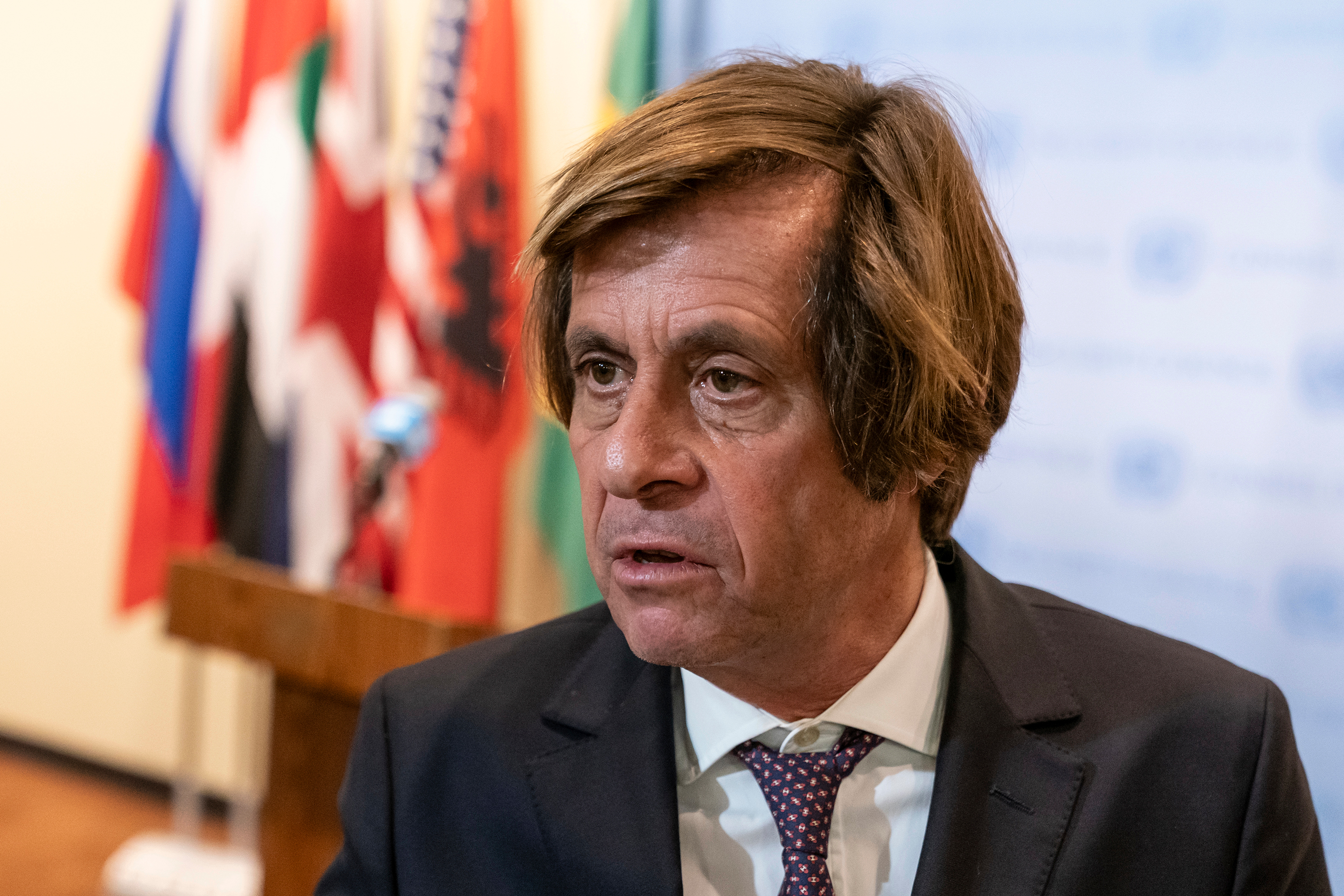
French UN Ambassador Nicolas de Rivière warned of any further escalations in Rafah, saying "it is high time," for the UN Security Council (UNSC) "to take action and to adopt a new resolution" about the war in Gaza.
"There must be an immediate ceasefire in Gaza and the unconditional release of the hostages. There is no safe zone for Palestinian civilians in Rafah," Rivière said in a statement Tuesday.
He added that the Security Council "must fulfill its mandate and take action now,"
"It must allow the UN to play its full role in the Gaza Strip, in order to cover the immediate needs of the population," he said.
"France will remain committed to building a state for the Palestinians and security guarantees for Israel," Rivière added.
Doctor describes sleepless nights and "very miserable" situation in Rafah
From CNN's Sarah EL Sirgany and Mohammed Tawfeeq
The situation in Rafah is "very miserable," according to a doctor currently working in the southern Gaza city.
"All night, we couldn't sleep," Dr. Safa Jaber told Doctors Without Borders, known by its French acronym MSF (Médecins Sans Frontières), in an Arabic audio message shared by the group on X with English subtitles.
"All night we heard the clashes, the bombings and the sound of the rockets. Nobody knows what is happening exactly. There are clashes in two different locations in Tal al-Sultan area, in the north and the south," Jaber said.
"I am speechless, I cannot even describe what is happening. We are scared for ourselves and for our children. We are not expecting this to happen so suddenly," she added.
"Everyone is very terrified. Where shall we go? We are heading to the so-called safe zone. But there is no safe space here after what happened the day before yesterday with the burning of tents," she explained.
"We are forced to stay in tents where we will be exposed to the heat, sand. We have to struggle to find water every day; both clean and salt water; the basic services that every human being needs to stay alive. The situation is very miserable," Jaber added.
"There is no shelter, no life, no future." Displaced Palestinians in Rafah wonder where they must move next
From Mohammed Al-Sawalhi, Sarah El Sirgany and Abeer Salman and Hira Humayun
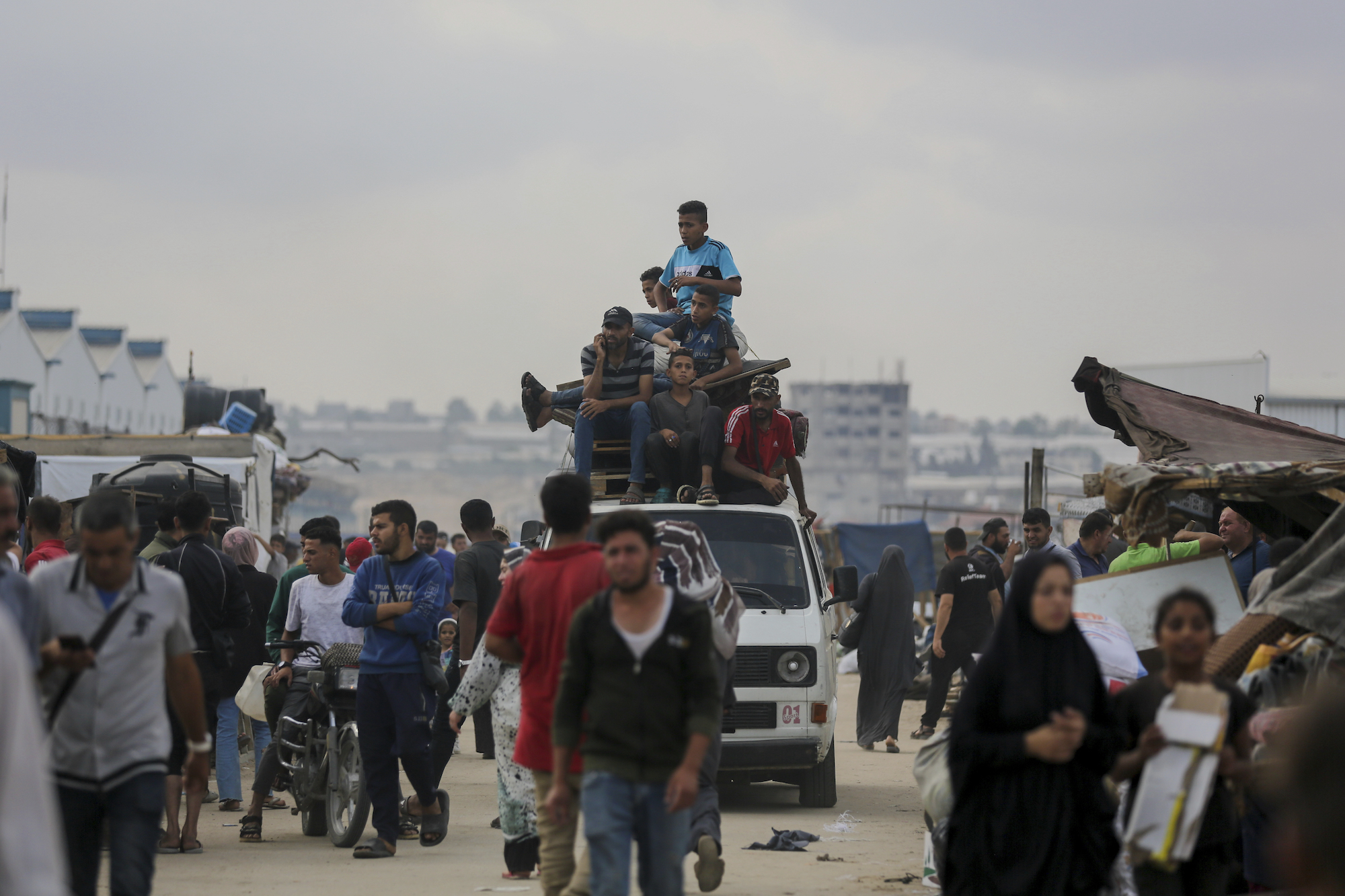
Displaced Palestinians are attempting to evacuate following devastating Israeli strikes in southern Gaza – but they don't know where to go.
Speaking to a CNN stringer in Khan Younis, north of Rafah, people said they did not know where else to go, as they tried to head north toward Deir El-Balah in central Gaza.
Video from the stringer shows mattresses, wooden panels, chairs, and various other belongings piled on top of vehicles and donkey carts.
"What’s happening now, whether in Rafah, Khan Younis or Gaza in general, is the disastrous displacement of people. There is no shelter, no life, no future," said Ansar Mahdi, who said she's been displaced four times.
"The displacement is repugnant. When people move from one place to another, they want to live.They need money. They’ve lost their savings," she said.
"They told us to move from the north to the south. We did. We stayed in tents in abysmal conditions. No words can convey what we went through," she added.
"Where else can we go? Where the next displacement would be?" Mahdi asked.
The roads, lined by tents and piles of garbage, were busy with people and vehicles moving in search of empty spaces.
Walking on crutches, Mohamed Jarbou, said, "The elderly have been humiliated. Children humiliated. What’s wrong? They are all civilians. The resistance is not here. The resistance is fighting somewhere else. We are displaced. Why are you hitting the displaced people?"
Israeli strikes over the past two days in Rafah have forced the already displaced people to flee.
More than two dozen people were killed in Israel strikes on two camps on Tuesday, according to Palestinian officials.
The Israeli military denied striking a humanitarian area in Al-Mawasi, telling CNN, "Contrary to the reports from the last few hours, the IDF did not strike in the Humanitarian Area in Al-Mawasi.”
CNN has asked if the military struck elsewhere in Al-Mawasi, and for comment on a strike that hit the Tal al-Sultan camp.
Israeli military says it's investigating if Rafah strike set off possible stored weapons near target
From CNN's Jen Deaton
The Israeli military is looking into the possibility that Sunday's strike on Rafah may have unintentionally set off possible stored weapons in a nearby compound and a large fire that decimated part of a camp housing displaced Palestinians, according to spokesperson Rear Admiral Daniel Hagari.
Hagari described it as one of several possibilities and did not provide any verifiable evidence to bolster the claim.
"Our investigation seeks to determine what may have caused such a large fire to ignite. We are looking into all possibilities, including the option that weapons stored in a compound next to our target, which we did not know of, may have ignited as a result of the strike," Hagari said in a press conference Tuesday.
He also said Israel is assessing social media footage from the night of the strike that appears to show secondary explosions.
Hagari then played the audio of an allegedly intercepted call, described by the Israel Defense Forces as "between two Gazans about the strike in Rafah."
An unidentified speaker says an ammunition warehouse exploded, causing secondary explosions. The unknown speaker also said the Israeli strike was "small" and did not create a large crater.
CNN cannot independently verify the authenticity of the audio, when it was recorded, or what information the speakers in the audio had.
Hagari said the incident was being investigated by the General Staff's Fact-Finding and Assessment Mechanism who he said would conduct a transparent investigation.
"Our war is against Hamas, not the people of Gaza. Which is why we convey deep sorrow for this tragic loss of life," he said.
CNN posed a follow-up question to Hagari, about whether Israel could confirm that none of the civilians killed were killed in the initial Israeli strike, only in the ensuing secondary explosions or the fire.
Hagari could not confirm that, repeating that the investigation was ongoing.
Crowds gather in European cities to protest Israel's deadly strike on camp for displaced people in Rafah
From CNN's Barbie Latza Nadeau, Xiaofei Xu and Niamh Kennedy
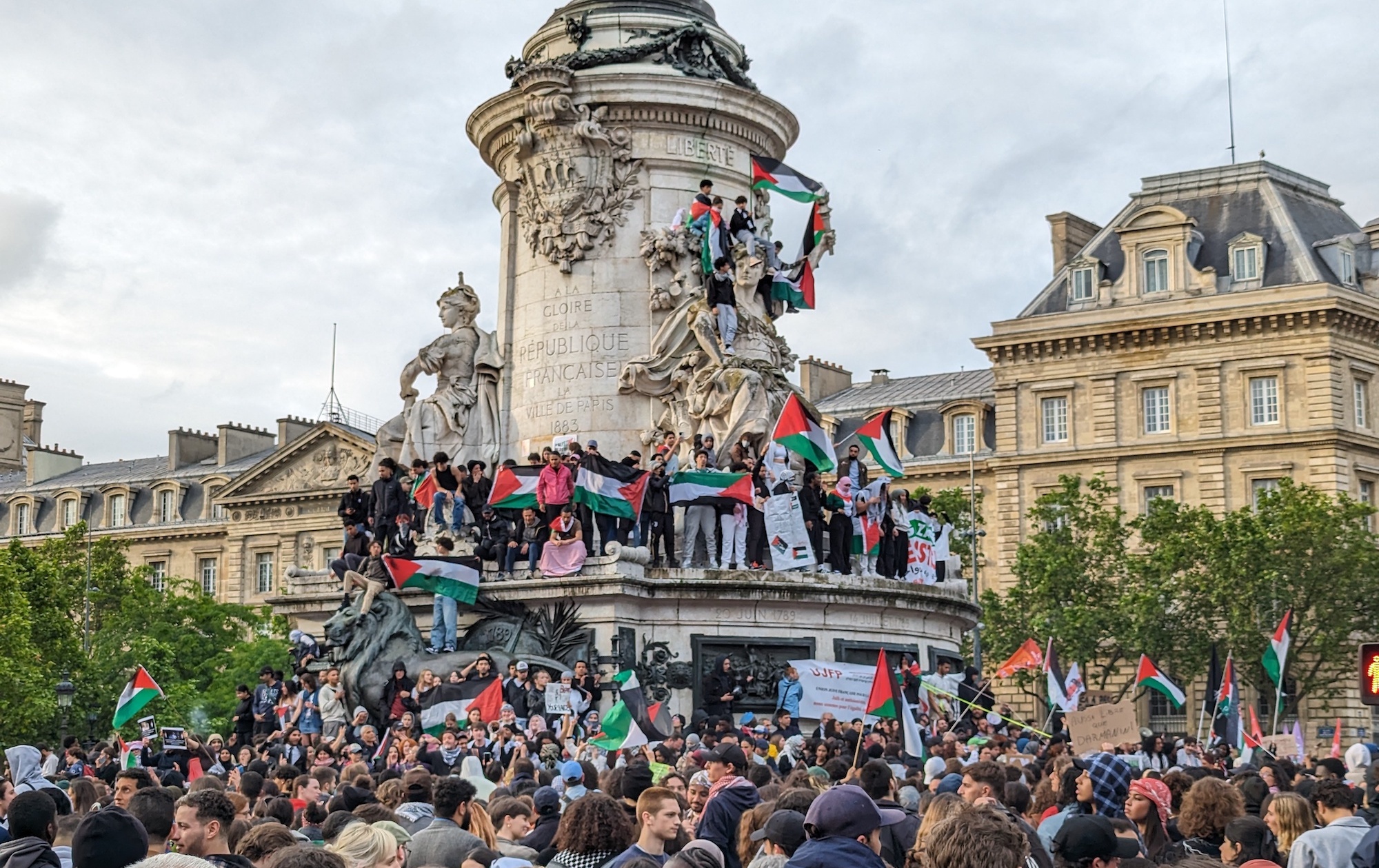
Protesters in cities across Europe gathered to voice opposition to the deadly strike carried out Sunday by Israel on a camp housing displaced people in Rafah in southern Gaza.
In Paris, a huge crowd congregated in Place de la République, a famous spot for protests. The demonstrators then marched to the nearby Canal Saint Martin, according to a CNN producer in Paris.
“Gaza, Gaza, Paris is with you,” some protesters could be heard shouting during the second night of large Paris protests.
Large crowds also gathered outside the home of UK Prime Minister Rishi Sunak on London's Downing Street.
In social media videos, they could be heard chanting slogans, "Blood on your hands" and "Stop arming Israel" in the direction of Downing Street.
Sunak has faced intense pressure in recent months from campaigners and opposition lawmakers to stop selling arms to Israel.
In Italy, at least 1,000 protesters occupied Bologna's main train station, according to the authority of the train station.
The protesters marched from the university district to the station and caused delays across the region, according to Italy’s national railway company.
“We brought our anger here, we will take it to the whole city,” protesters could be heard shouting.
White House says attack at Rafah camp didn't cross Biden's red line and there are "no policy changes"
From CNN's Samantha Waldenberg
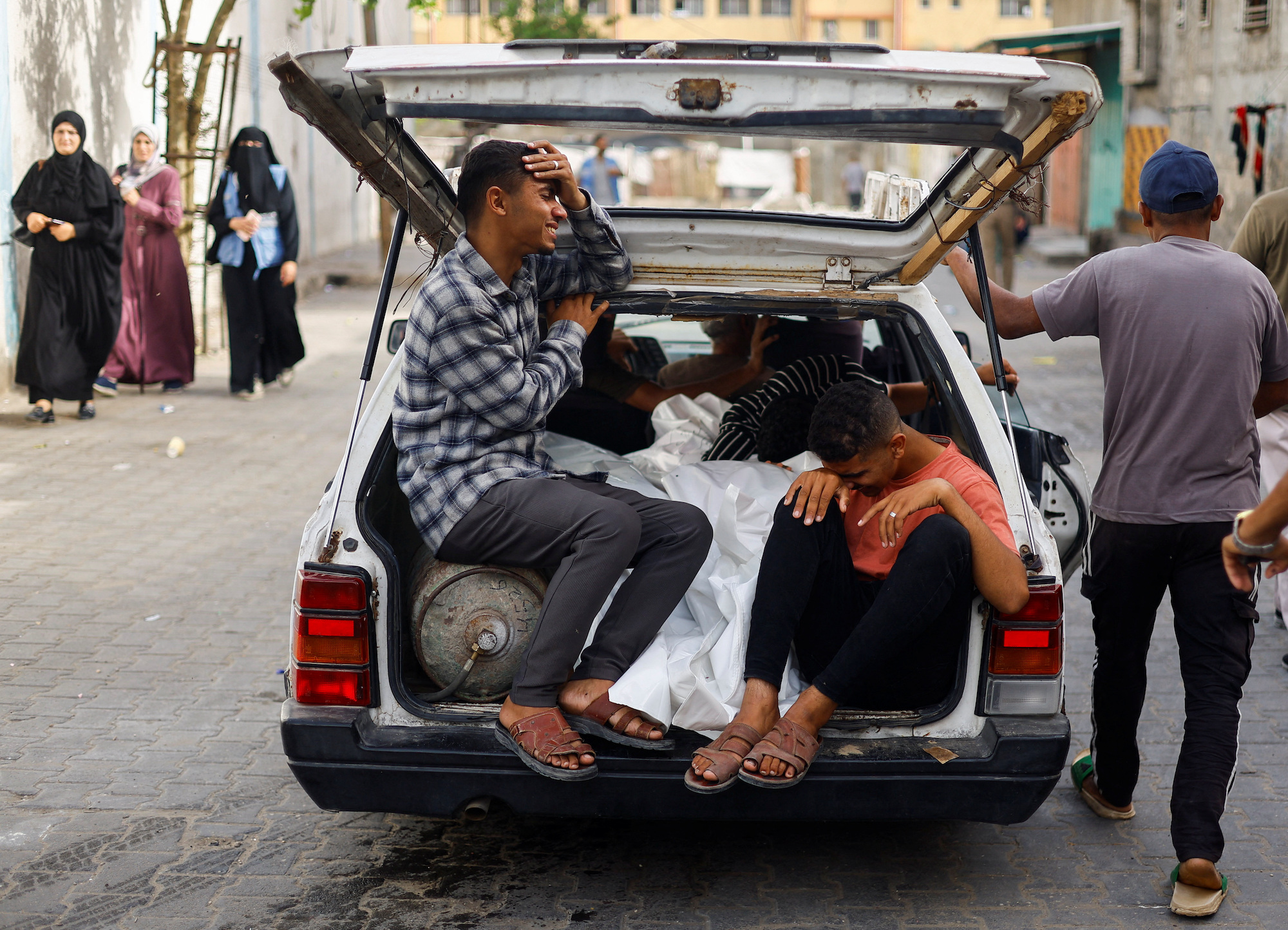
White House National Security Council spokesperson John Kirby told reporters Tuesday that Sunday’s airstrike that killed dozens of people at a camp for displaced Palestinians in Rafah, Gaza, did not cross President Joe Biden's red line.
“We don’t want to see a major ground operation, we haven’t seen that at this point,” Kirby said in Tuesday’s press briefing when asked how this attack does not cross the president’s red line.
Kirby added that he had “no policy changes to speak to” when asked if this strike would change policy – but emphasized that this strike “just happened.”
At least 45 people were killed and more than 200 others injured after a fire broke out at the camp following the strike on Sunday, most of them women and children, according to the Gaza Health Ministry and Palestinian medics.
When asked whether the president has seen some of the images from Rafah over the weekend, Kirby said he could not speak on that but that the president has been “kept apprised throughout the weekend.”
Footage obtained by CNN showed the camp in flames, with scores of men, women and children frantically trying to find cover from the nighttime assault. Burned bodies, including those of children, could be seen being pulled by rescuers from the wreckage.
Pressed on whether Israel tanks seen in central Rafah constitute a major ground operation, Kirby pointed to comments from the Israelis saying that they are operating in Rafah in a “targeted” and “precise” way.
“That's what the Israelis have said, we're not on the ground,” Kirby told reporters.
Nearly 1 million people have been displaced from Rafah over the past three weeks, UNOCHA says
From CNN's Richard Roth and Mohammed Tawfeeq
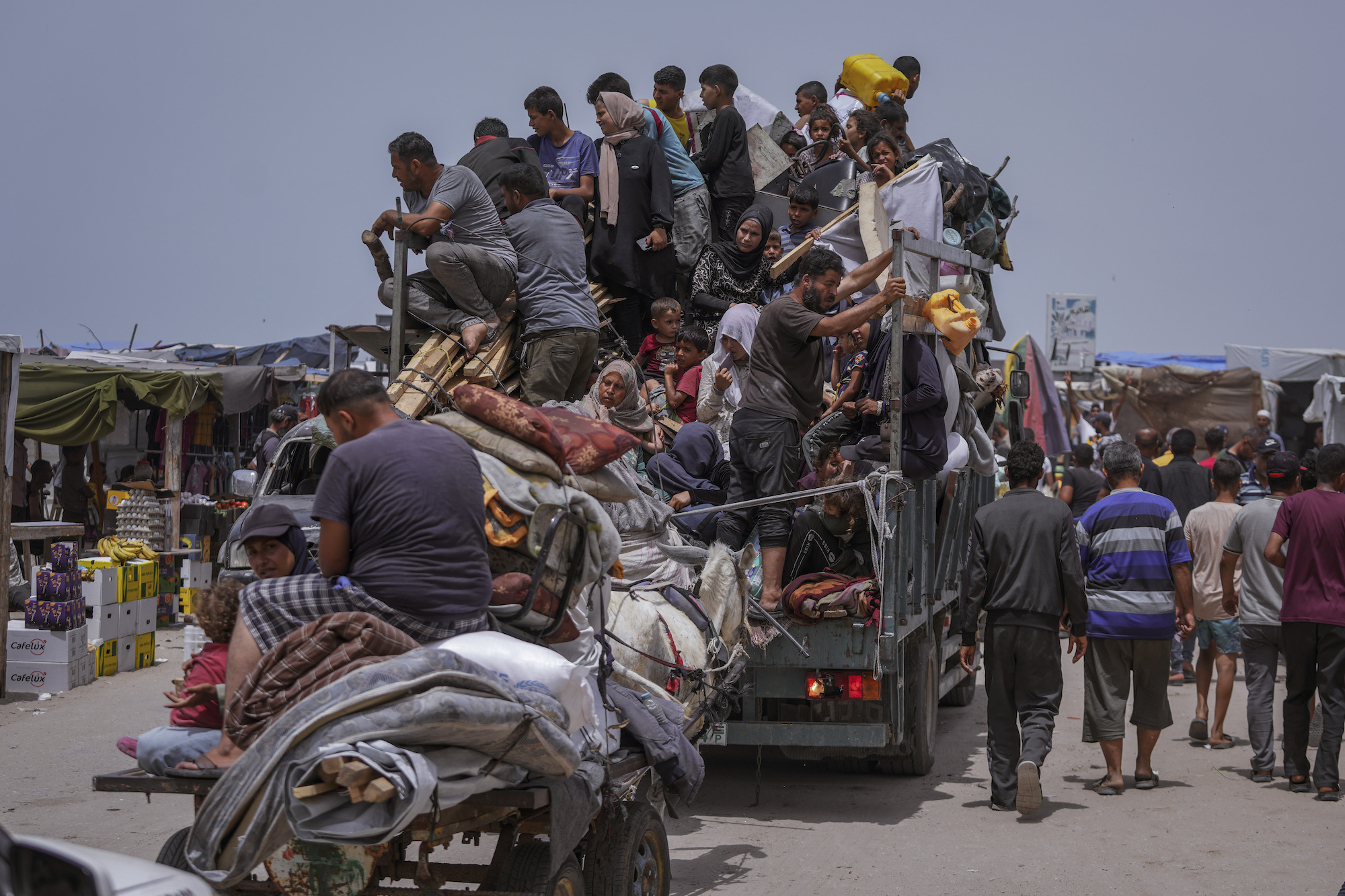
At least 940,000 people have been displaced from Rafah in the past three weeks as a result of "the intensification of hostilities and issuance of evacuation orders" by Israeli forces, according to the UN Office for the Coordination of Humanitarian Affairs (UNOCHA).
"Attacks on Rafah have continued unabated, and civilians displaced by hostilities lack shelter, they lack food, they lack water and other supplies essential to their human survival," UNOCHA said in a statement Tuesday read by Deputy UN spokesman Farhan Haq.
"Health facilities there continue to face dire shortages of fuel and medical supplies while having to cope with a rising influx of casualties due to injuries and burns," UNOCHA statement added.
"While the Kerem Shalom crossing remains open in principle, it is extremely difficult for aid organizations to access from the Gaza side due to the hostilities, challenging logistical conditions, and complex coordination procedures," UNOCHA said, citing aid workers in Gaza.
At least 29 Palestinians have been killed in two separate Israeli attacks in Rafah on Tuesday, according to Gaza’s Ministry of Health and the Emergency Committee of the Rafah Governorate.
The Israel Defense Forces (IDF) told CNN on Tuesday that its forces are "operating to dismantle Hamas military and administrative capabilities."
"In stark contrast to Hamas' intentional attacks on Israeli men, women and children, the IDF follows international law and takes feasible precautions to mitigate civilian harm," the IDF added.
UNRWA says staff are "terrified" and moving following strike in Tal al-Sultan
From CNN staff
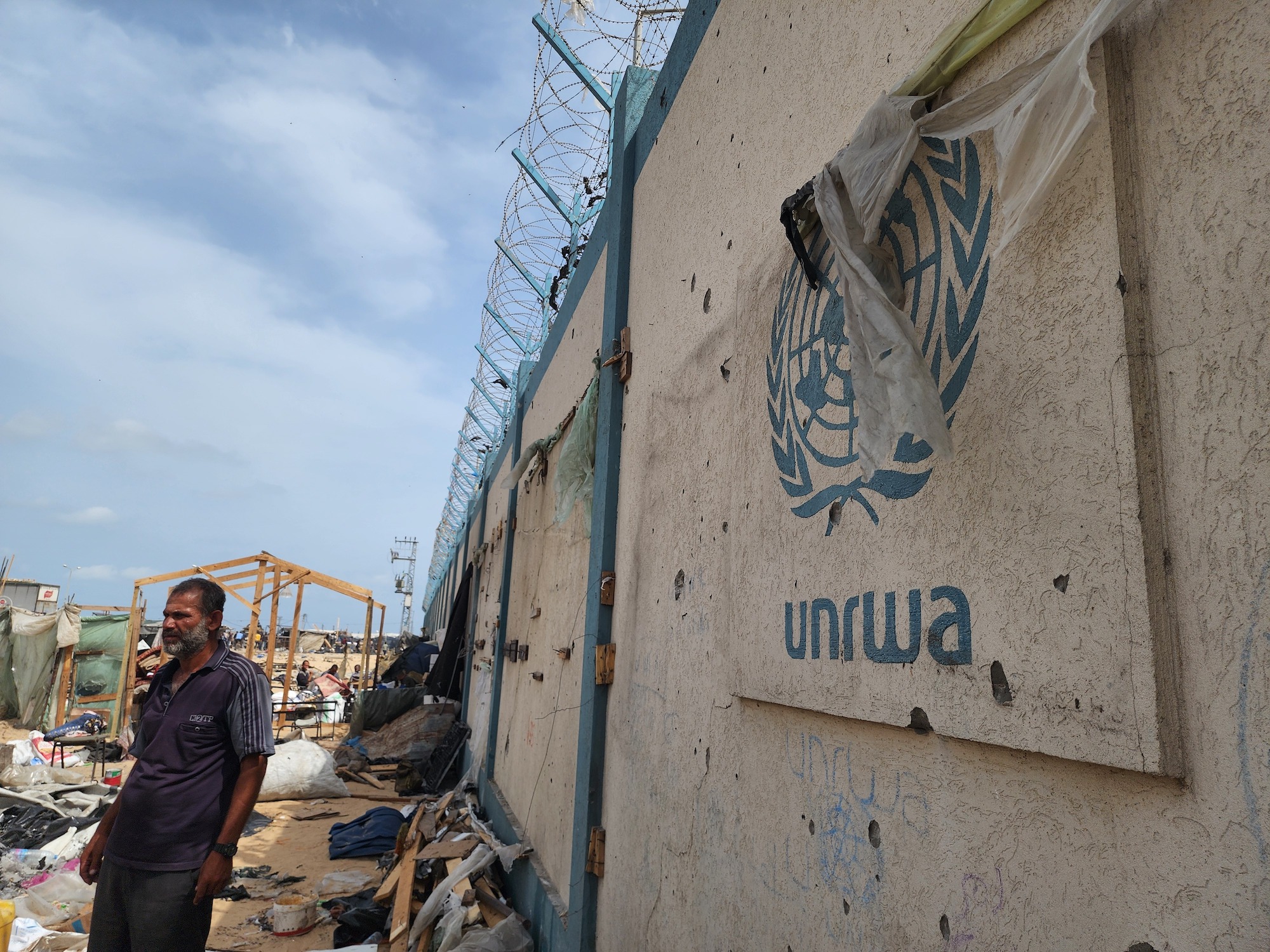
UNRWA Commissioner-General Philippe Lazzarini said his staff are "terrified" and are packing up and moving following strikes in Tal al-Sultan in the early hours of Tuesday.
Lazzarini said the main offices of the UN in Gaza are in the Tal al-Sultan area and that most of the staff could not make it to work.
“UNRWA running out of medical supplies and basic medicines. Little to no electricity with very patchy internet as the telecommunications network continues to be interrupted. People search for safety to no avail," he said.
"An endless horror show, except it’s real."
Some context: Officials in Gaza and residents said an Israeli attack happened at around 3 a.m. on Tuesday (local time) in Tal al-Sultan camp in western Rafah, hitting three tents and killing at least eight people.
CNN has reached out to the IDF for comment.
“They kept bleeding until they died.” Residents of Tal al-Sultan camp recount horror of Israeli strike
From Tareq El Helou in Rafah and CNN’s Abeer Salman and Zeena Saifi
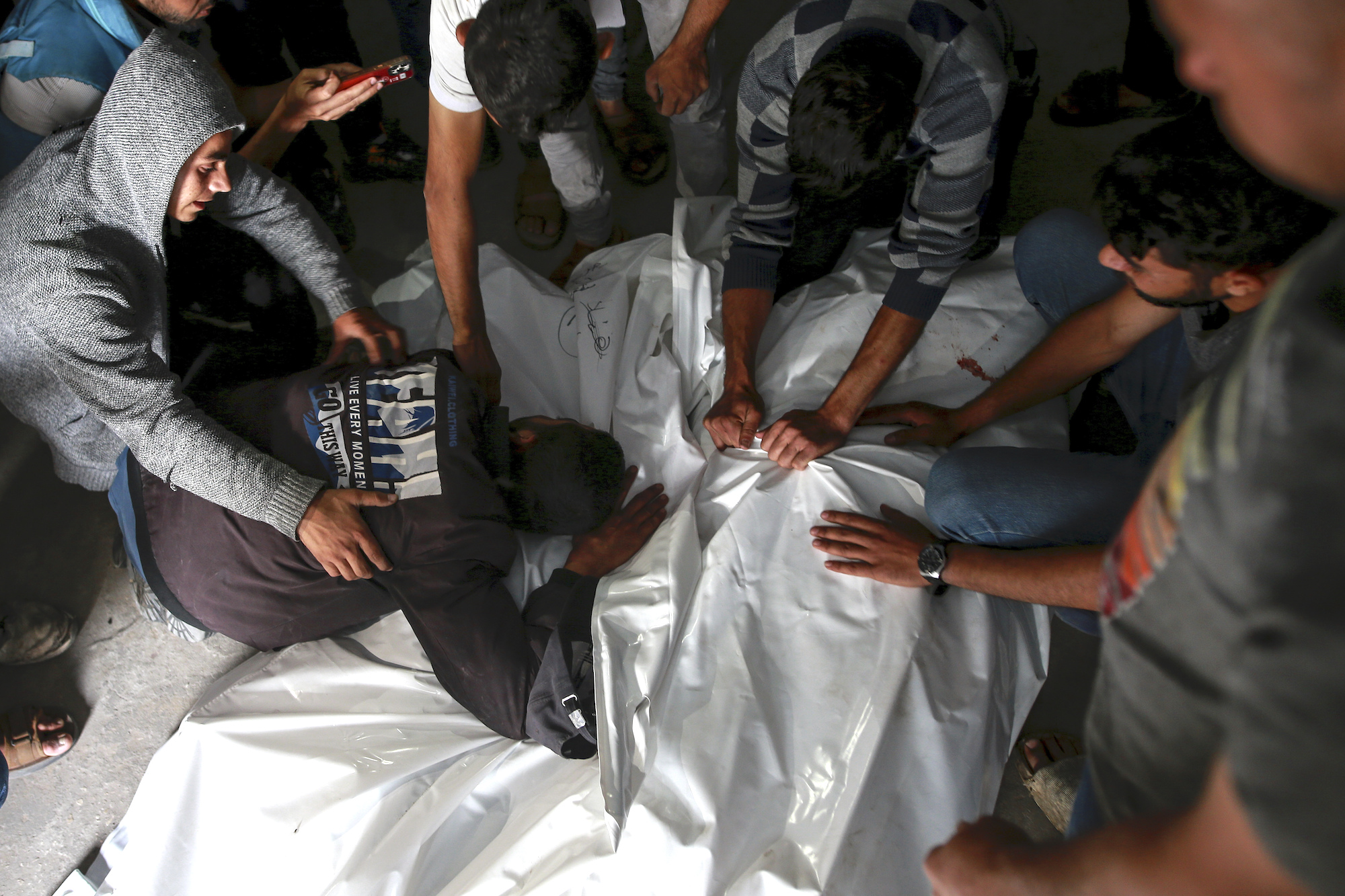
Residents of the Tal al-Sultan displacement camp in western Rafah have recounted to CNN the horrifying scenes that followed an Israeli strike Tuesday, which according to Palestinian and UN officials killed eight people.
Video of the aftermath from a CNN stringer shows torn up tents, burnt sheets of metal and a clutter of furniture and clothing thrown on the ground. Walls are pierced with holes and the wooden structures holding up the tents are completely damaged.
CNN has reached out to the IDF regarding the strike, but has not received a response.
One resident, Hind Al-Ashqar, told CNN she was asleep with her family when she awoke to the sound of her neighbors screaming.
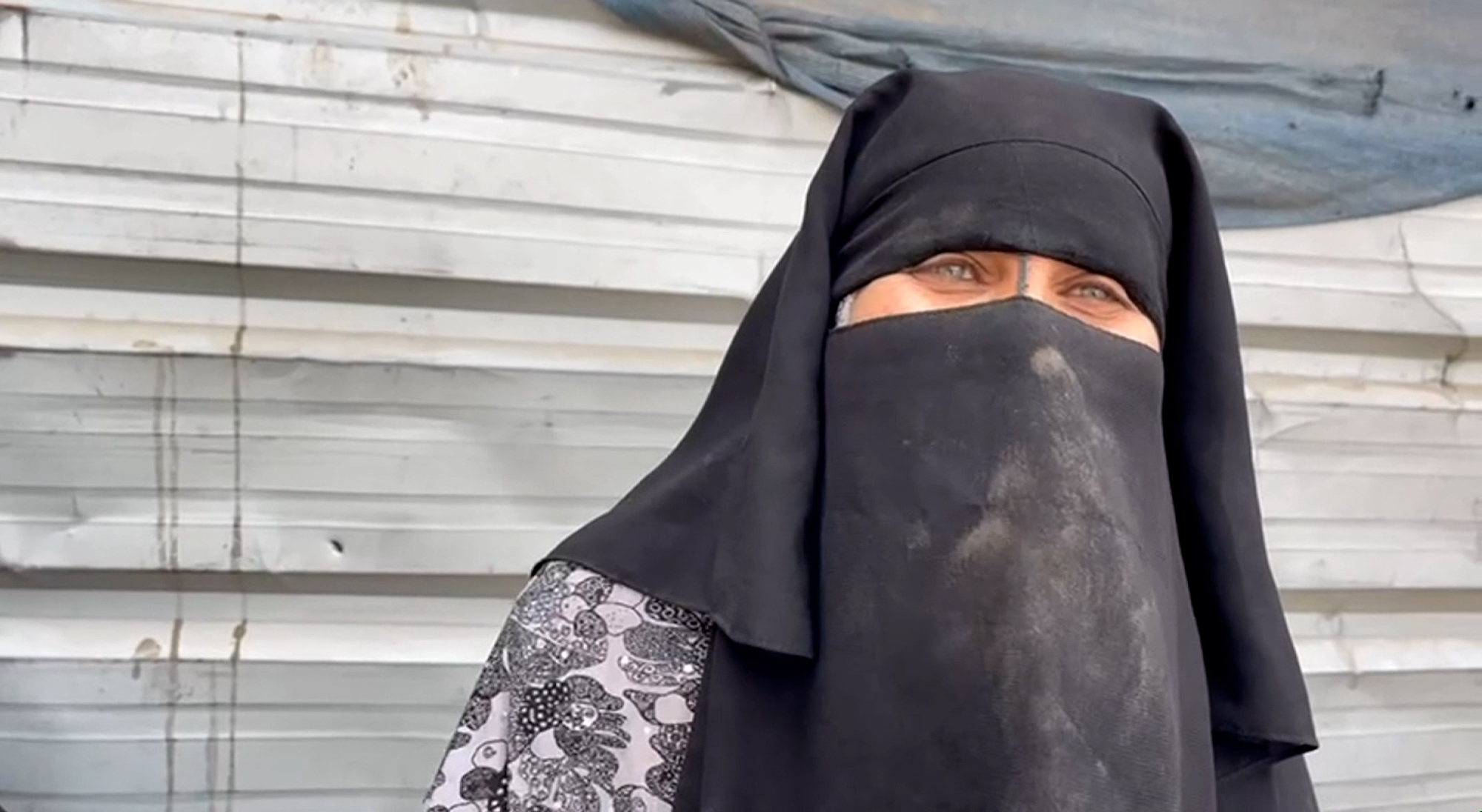
“Our children were terrified; I have a 5-year-old that was so horrified. We were all scared, children and adults,” she said.
Al-Ashqar’s daughter Ayat said she ran out of their tent to check on their neighbors, some of whom were her relatives, only to find them dead on the ground.
“They kept bleeding until they died,” she said.
“I was so terrified to see the remains of people. We have been displaced and living in nylon tents. We see remains and body parts of martyrs, we see the strikes and shrapnel hitting us. If we were in our homes, we wouldn’t be afraid of shrapnel. But inside tents, any shrapnel can hit us and even burn us,” Ayat continued.
Another resident, Imad, pulled out the remains of a person while rummaging through the torn-up tents, saying “this is the safe place they talk about."
“All those that were killed were civilians. No one was a fighter,” he said.
Another resident, Mohammed, told CNN people were asleep when they were killed, including his cousin. He said he has been picking up dead bodies of children and body parts since the morning, pointing to his blood-stained shirt.
“Instead of waking up and saying thank God, we woke up and picked up body parts…. every day there is a war. Enough is enough…the whole world is living freely and happily except us. Why? How is the whole world unable to stop Israel and Netanyahu?” he said.
A displaced woman Suhad told a CNN stringer she had been sheltering in a nearby camp when she heard there had been a strike on her brother's camp.
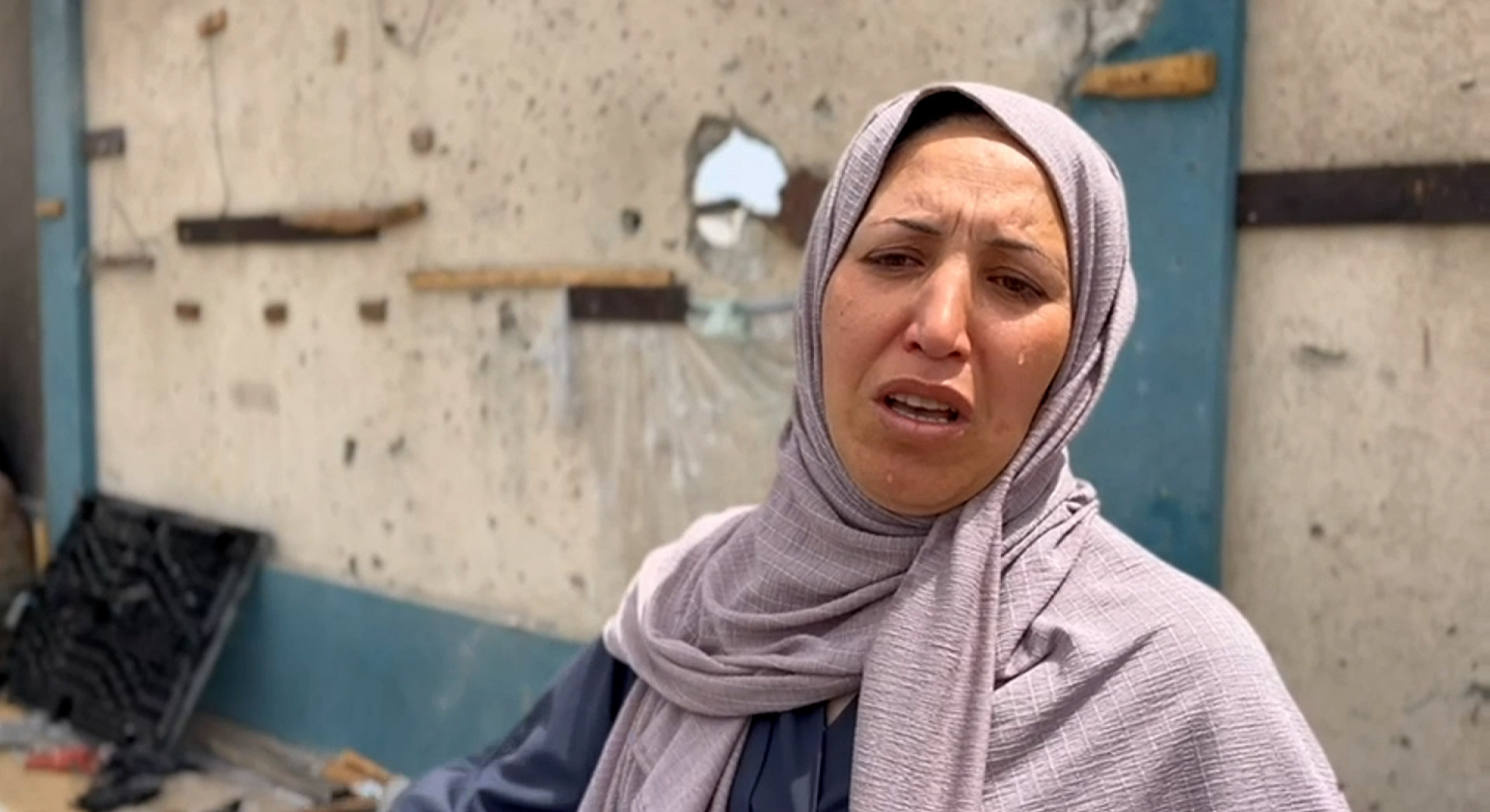
“I didn’t sleep all night. I was told he was martyred, then he wasn’t. He was martyred, then he wasn’t.
"I think no one wanted to tell me because I’m pregnant. So I came by this morning and saw that my brother and his wife were killed,” she said.
She said her brother’s four daughters, the youngest three months old, survived but were injured.
CNN stringer video from the scene shows dozens of people dismantling the remains of their makeshift tents, gathering what’s left of their belongings and loading them onto trucks and donkey carts. They told a CNN stringer on the ground that they are forced to flee again, some for the sixth time, out of fear of being killed.
"We were in the North, they struck our home, and my dad was martyred. They said go east of the valley, we went to Nuseirat. They hit Nuseirat, we fled to Khan Younis. They entered Khan Younis, we fled to Rafah. After they entered Rafah, we wanted to go back to Khan Younis. God knows where we shall go next. There is no safe place in Gaza," Mohammed said.
Another man, wearing a gray baseball cap, said, "For God's sake, look at us, show us some respect. We want nothing from you. We want to live like in all other countries. We want freedom. We want stability... We are not beggars waiting for aid. The people of Palestine are not a field for experimentation. Enough, enough."
US pier constructed off Gaza has broken apart
From CNN's Oren Liebermann, Natasha Bertrand and Paul P Murphy
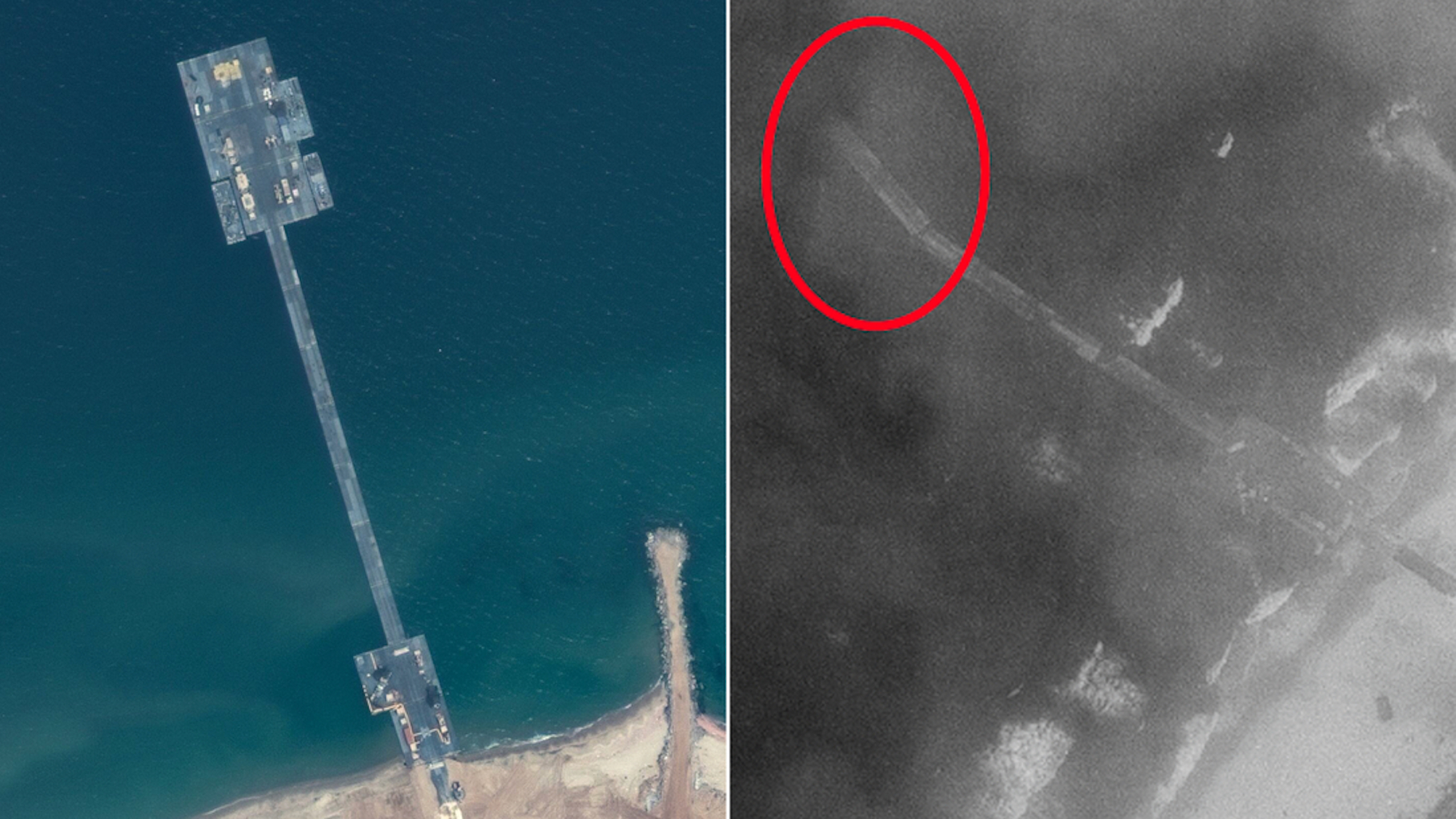
The temporary pier constructed by the US military to transport aid into Gaza broke apart in heavy seas on Tuesday in a major blow to the American-led effort to create a maritime corridor for humanitarian supplies into the war-torn enclave, according to four US officials,
Part of the pier, which consists of a narrow causeway to drive aid into Gaza and a wider parking area to drop off supplies transported by ship, disconnected on Tuesday, the officials said. The parking area will have to be reconnected to the causeway before the pier can be used again.
The setback came one day after heavy seas forced two small US Army vessels to beach in Israel, according to US Central Command, while another two vessels broke free of their moorings and were anchored near the pier.
The effort to reassemble the causeway and connect it once again to the parking area will resume when sea conditions allow, officials said.
The pier, which cost $320 million, had only begun operating on May 17 when heavy seas forced the maritime shipments to stop one week later on May 24 – two days before part of the pier disconnected. It is unclear when shipments will resume.
The temporary pier, called the Joint Logistics Over the Shore (JLOTS), requires very good sea conditions to operate. CNN reported previously that JLOTS can only be operated safely in a maximum of 3-foot waves and winds less than approximately 15 miles per hour.
Heavier sea conditions delayed the deployment of the pier for several weeks, as the system sat docked in the Israeli port of Ashdod waiting for favorable conditions.
The US has stressed that the temporary pier is only meant to augment humanitarian shipments going through the land crossings between Israel and Gaza.
On Thursday, Vice Admiral Brad Cooper, deputy commander of US Central Command, said 820 metric tonnes of aid had been delivered through the pier to the Gaza beach, where the United Nations was responsible for distributing it to the Palestinian population
Daniel Dieckhaus, the director of USAID’s levant response management team, told reporters Thursday that there were “thousands and thousands of tonnes” of aid waiting in Cyprus to be delivered through the maritime corridor. But those shipments are now paused with the temporary pier inoperable.
US will be watching results of Israeli probe into Rafah strike "closely," State Department says
From CNN's Jennifer Hansler
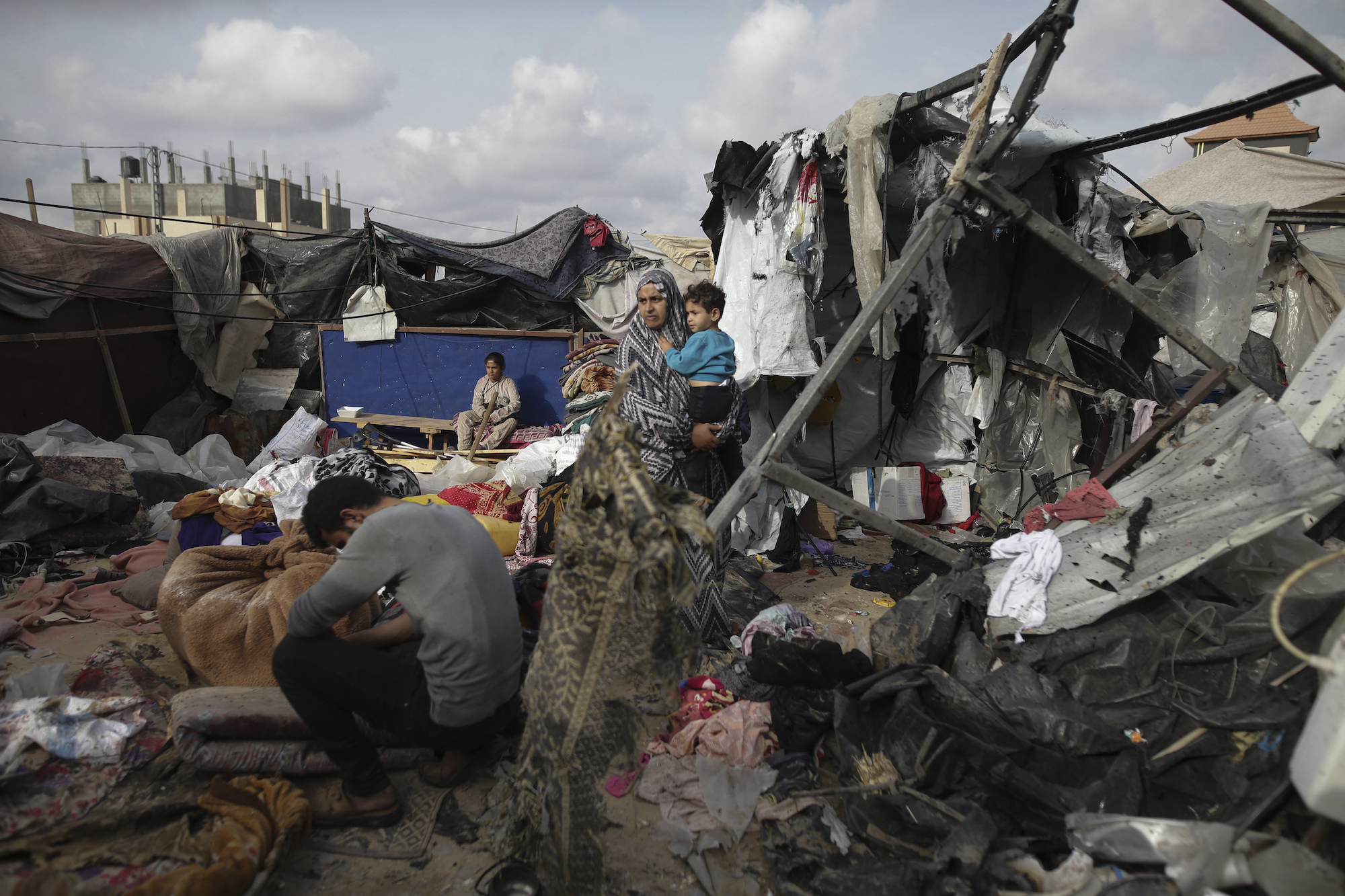
The United States “will be watching” the results of the Israeli investigation into the deadly strike and subsequent fire in Rafah “closely,” State Department spokesperson Matthew Miller said Tuesday, saying that the findings should be “presented openly and transparently to us and to the world.”
“We are deeply saddened by the tragic loss of life in Rafah over the weekend,” Miller said at a briefing, calling the images from the scene “heart breaking.”
Miller said the US will withhold its assessments until it sees the final findings of Israel's investigation.
“As soon as the United States saw reports of this incident, we reached out to the government of Israel to express our deep concern over what happened, ask for more information and urge them to undertake a full investigation,” he said.
“Earlier today, Israel announced the results of a preliminary investigation and said that this strike was carried out using the smallest bomb in their arsenal, targeting terrorists 1.7 kilometers (1 mile) away from the Al Mawasi area, where this fire took place,” Miller said.
“The IDF is continuing to investigate this matter (and has) promised that its investigation will be swift, comprehensive and transparent. We will be watching those results closely. And we will continue to emphasize to Israel their obligation to comply fully with international humanitarian law, minimize the impact of their operations on civilians, and maximize the flow of humanitarian assistance to those in need,” he said.
Miller added that it is important to “find out what the actual cause of the fire is,” noting the Israeli claim that there might a weapons depot nearby.
Some background: At least 45 people were killed and 200 others were injured in the strike. Video from the site showed scenes of horror: charred bodies being pulled from rubble, a man holding the headless body of a child, fire raging from tents in the background.
At least 29 killed in two separate Israeli attacks in Rafah on Tuesday, Palestinian officials say
From Tareq El Helou in Rafah and CNN’s Abeer Salman and Zeena Saifi
At least 29 Palestinians have been killed in two separate Israeli attacks in Rafah on Tuesday, according to Gaza’s Ministry of Health and the Emergency Committee of the Rafah Governorate.
The first attack happened at around 3 a.m. on Tuesday (local time) in Tal al-Sultan displacement camp in western Rafah when a strike hit three tents, according to residents and a CNN stringer in Rafah. At least eight people were killed and transferred to a field hospital in Tal Al-Sultan camp, according to the committee.
The Tal al-Sultan camp is located next to a UN warehouse, whose walls were damaged from the strike according to video from a CNN stringer on the ground. The camp that was hit on Tuesday is about 150 meters away from another displacement camp that an Israeli strike and ensuing fire hit just two days ago, killing at least 45 people and wounding more than 200 others.
Video from CNN's stringer on the ground shows displaced people dismantling their makeshift living arrangements in Tal al-Sultan camp, and gathering their belongings and evacuating the area on trucks and donkey carts.
Gaza's Ministry of Health says a second attack happened on Tuesday afternoon local time when an Israeli strike hit a displacement camp in the southern coastal town of Al-Mawasi, killing at least 21 people, including 13 women, and injuring at least 64 people with 10 in critical condition.
However, the Israeli military has denied striking a humanitarian area in Al-Mawasi.
It told CNN in a statement: "Contrary to the reports from the last few hours, the IDF did not strike in the humanitarian area in Al-Mawasi."
CNN has followed up, asking if the IDF has struck elsewhere in Al-Mawasi, such as the UN warehouse that is in the vicinity of the camp, but has not received a reply.
This post has been updated to include a response from the IDF.
Israeli tanks roll into the center of Rafah. Here’s what you need to know
From CNN staff
Israeli tanks have been seen in central Rafah for the first time in Israel’s seven-month war against Hamas, signaling a new phase of its offensive as Israel presses on despite mounting international pressure.
The ground offensive comes just days after Israel launched an airstrike on a displacement camp in the southern Gaza city, killing dozens and sparking global outrage.
Meanwhile, three European countries on Tuesday recognized a Palestinian state, and others are considering taking the same step.
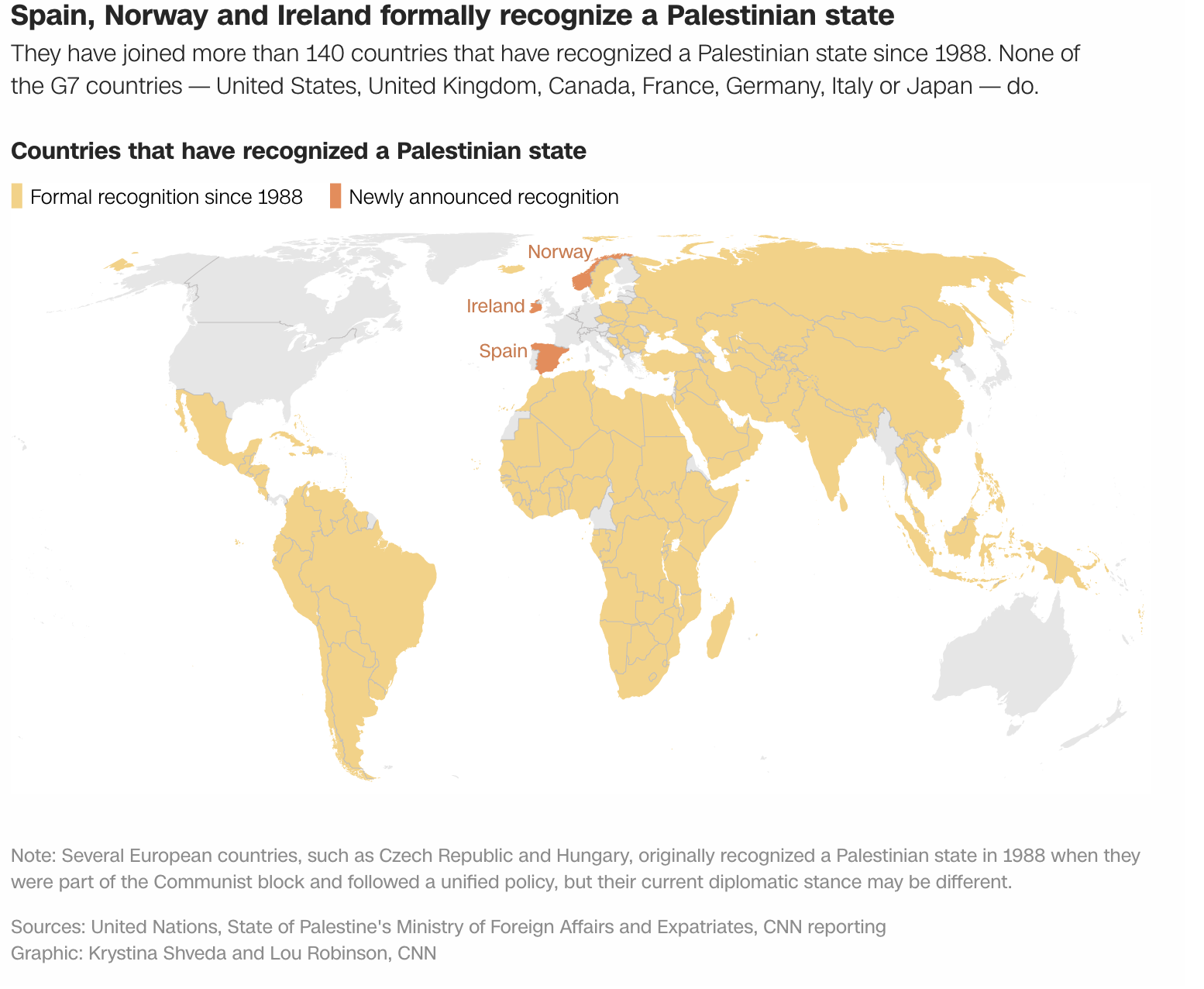
Here are the latest developments:
- Tanks in Rafah: Israeli tanks rolled into Rafah on Tuesday, eyewitnesses told CNN. Alaa Abu Ibrahim, a resident, said the tanks were seen in Al Awda roundabout in the city center; another witness said the tanks “advanced in the middle of the night.” Israel began its assault on Rafah on May 6 despite calls for restraint, saying it needed to enter the city to complete its war aim of destroying Hamas.
- Camp strike “error:” Israeli Prime Minister Benjamin Netanyahu said Israel’s strike on a camp for displaced Palestinians in Rafah – which killed at least 45 people and injured 200 others – was a “tragic error.” A US official told CNN Monday that Israel had told the Biden administration it used a precision munition to hit a target in Rafah, but that the explosion ignited a nearby fuel tank, engulfing the camp in flames.
- Global condemnation: But Israel’s strike drew barbed comments from many of its closest allies, urging Israel to abide by the ruling of the International Court of Justice (ICJ), which last week ordered Israel to immediately halt its offensive in Rafah. France has called for Israeli operations in Rafah to cease.
- Palestinian state recognition: Spain, Norway and Ireland on Tuesday formally recognized a Palestinian state, joining more than 140 countries to have done so since 1988. The three European countries will begin the process of appointing an ambassador and opening an embassy in Palestinian territories. Slovenia will also this week consider a proposal to recognize an independent Palestinian state.
- Gaza aid deliveries: More than 370 trucks carrying humanitarian aid entered Gaza Monday – including 154 trucks via the Kerem Shalom crossing – Israeli officials said. But UNRWA, the main United Nations agency for Palestinian refugees, said Monday that it picked up just 30 trucks for distribution in Gaza due to heavy movement restrictions and ongoing hostilities.
- Rafah displacement: About 1 million people have fled Rafah over the past three weeks, according to UNRWA. Many of these people had fled to Rafah after being displaced by fighting in the north of Gaza – only to now be displaced again. “Day after day, providing assistance and protection becomes nearly impossible,” said UNRWA.
Israeli military operating in Rafah in a "targeted" and "precise" way, says spokesman
From CNN’s Mostafa Salem in Abu Dhabi
The Israel Defense Forces (IDF) are operating in Rafah in a “targeted” and “precise” way, spokesman Rear Admiral Daniel Hagari said Tuesday, in response to a question on reports of tanks advancing in the southern Gazan city.
“There are still Hamas battalions in Rafah. A couple of days ago, launchers from Rafah fired to Tel Aviv, millions of people went into bomb shelters,” he said, referring to an attack Sunday claimed by Hamas.
“Today, and the day before, we've again detected tunnels along the Philadelphi Corridor, those are tunnels going to Sinai,” he added.
Hagari said the IDF is demolishing the tunnels into Sinai and speaking with the Egyptian government. His comments came shortly after eyewitnesses told CNN that Israeli tanks had reached the center of Rafah -- a first in the seven-month war.
Some context: The Philadelphi Corridor is a 14-kilometer (about 8.7-mile) long and 100-meter-wide strip of land running along the border between Gaza and Egypt. Israeli troops moved into the corridor and took control of the Rafah crossing earlier this month.
Israeli military says fire at Rafah camp not caused by Israeli weaponry alone
From CNN's Niamh Kennedy and Mike Schwartz
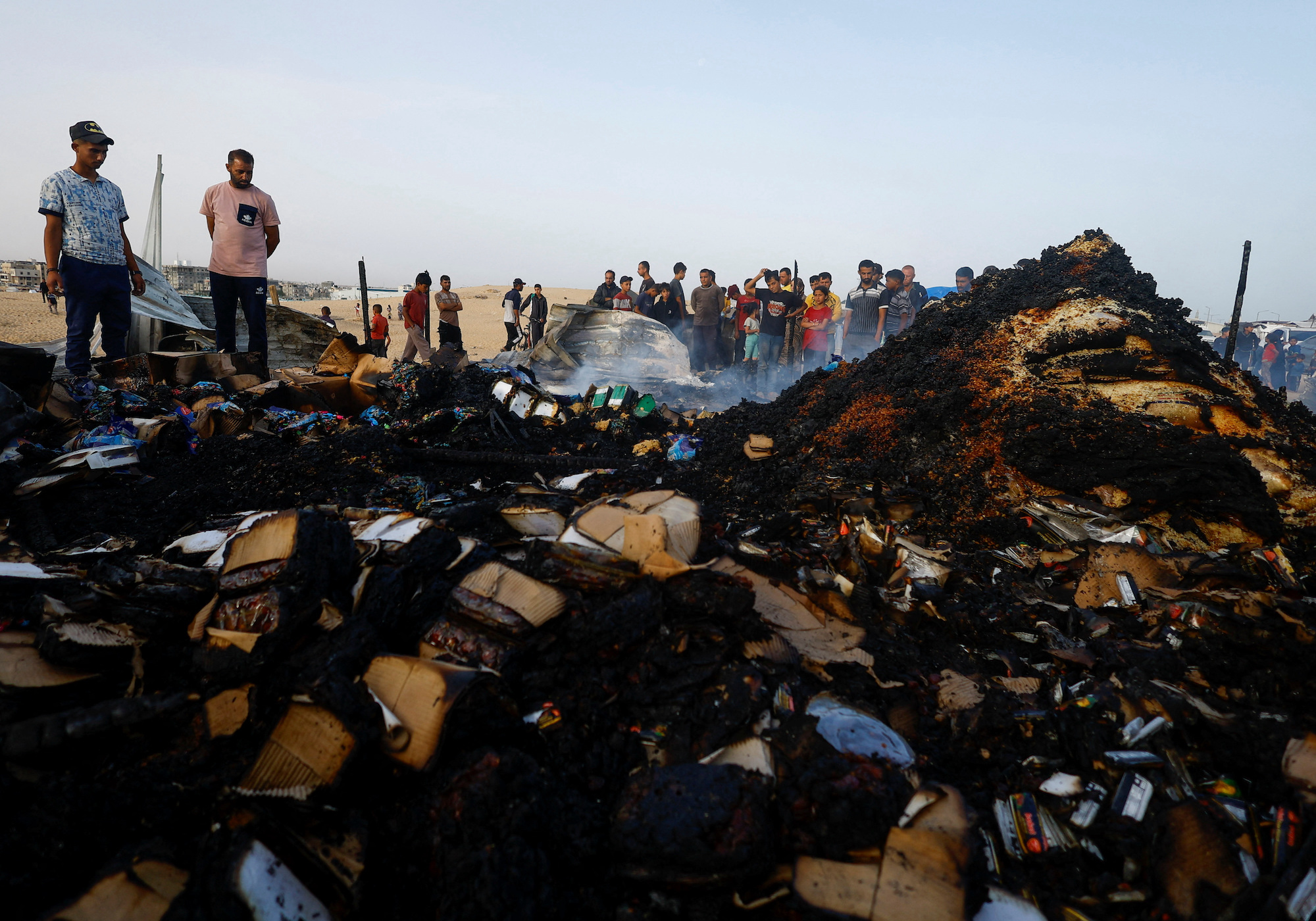
The Israel Defense Forces (IDF) said the deadly fire at displacement camp in Rafah was not caused solely by weapons used by the Israeli military.
“Our munitions alone could not have ignited a fire of this size, our investigation seeks to determine what may have caused such a large fire to ignite,” IDF spokesman Rear Admiral Daniel Hagari said in a briefing.
Hagari said the IDF is “looking into all possibilities, including the option that weapons stored in a compound next to our target, which we did not know of, may have ignited as a result of this strike.”
Hagari showed aerial footage of a strike on a structure, in which, he says senior Hamas commanders were meeting. He added that the strike used two munitions with small warheads with 17 kilos munitions -- "the smallest munitions that our jets could use."
“We are working to verify the cause of the fire, it is still too early to be determined,” Hagari said. “Even when we do find the cause of the fire that erupted it won’t make this situation any less tragic."
Hagari also said the Israeli military had carried out aerial surveillance assessing the civilian presence in the area before carrying out the strike, "to minimize civilian harm."
The surveillance video released by the IDF shows at least three people on the road near the targeted buildings at the moment of the strike.
Alongside the aerial surveillance, Hagari said the Israeli military had delayed the attack "to further assess expected civilian presence."
Some background: At least 45 people were killed and 200 others were injured in the strike. Video from the site showed scenes of horror: charred bodies being pulled from rubble, a man holding the headless body of a child, fire raging from tents in the background.
UNSC resolution on Rafah "more necessary than ever," says French foreign ministry
From CNN’s Joseph Ataman in Paris
France has called for Israeli operations in Rafah to cease ahead of an emergency meeting of the United Nations Security Council, the foreign ministry said in a statement Tuesday.
“These operations must stop, as the International Court of Justice (ICJ) demanded,” the ministry said, adding that a new resolution is “more necessary than ever.”
The statement also called for the UN to be allowed to meet the “immediate needs” of the population and to allow the Palestinians to “govern a territory that must be an integral part of their state.”
The ICJ last week ordered Israel to halt its military operation in Rafah, as international pressure mounts on Israel to rein in its assault.
Israel presented mediators with new ideas on hostage and Gaza ceasefire talks, says diplomatic source
From CNN’s Alex Marquardt
Israel has presented mediators with new ideas on the hostage-for-ceasefire, a diplomatic source familiar with the negotiations said Tuesday. The source could not expand on what the new ideas are.
The diplomatic source has not heard of any wider meetings happening Tuesday.
Indirect talks between Israel and Hamas were paused three weeks ago without an agreement.
CNN reported Tuesday that Egypt muddied the negotiations after independently changing the terms of a framework that Israel had signed on to and presented it to Hamas who then declared they accepted it.
The proposal had been changed without the knowledge of Israel or the other mediators, the US and Qatar, prompting anger and frustration.
Hamas announced earlier this month that it had accepted a deal, but Israel swiftly said the terms were "far from" meeting its demands.
Israeli tanks seen in central Rafah for the first time, eyewitnesses say
From CNN’s Ibrahim Dahman
Israeli military tanks were seen in central Rafah on Tuesday for the first time since the Israel Defense Forces (IDF) entered the southern city earlier this month, two eyewitnesses told CNN.
A Rafah resident, Alaa Abu Ibrahim, told CNN that Israeli tanks were seen in Al Awda roundabout in the center of the city.
Another Rafah resident, Salma AlKadoomi, said she saw Israeli armored vehicles in the downtown area of the city near the Abu Hashem building.
“These vehicles advanced in the middle of the night,” AlKadoomi said.
The sighting of tanks comes after Israel launched a missile strike on a displacement camp near Rafah, killing dozens and prompting international calls for Israel to abide by the ruling of the International Court of Justice, which ordered Israel to halt its offensive in the city.
Ireland formally recognizes the State of Palestine
From CNN’s Louis Mian in London
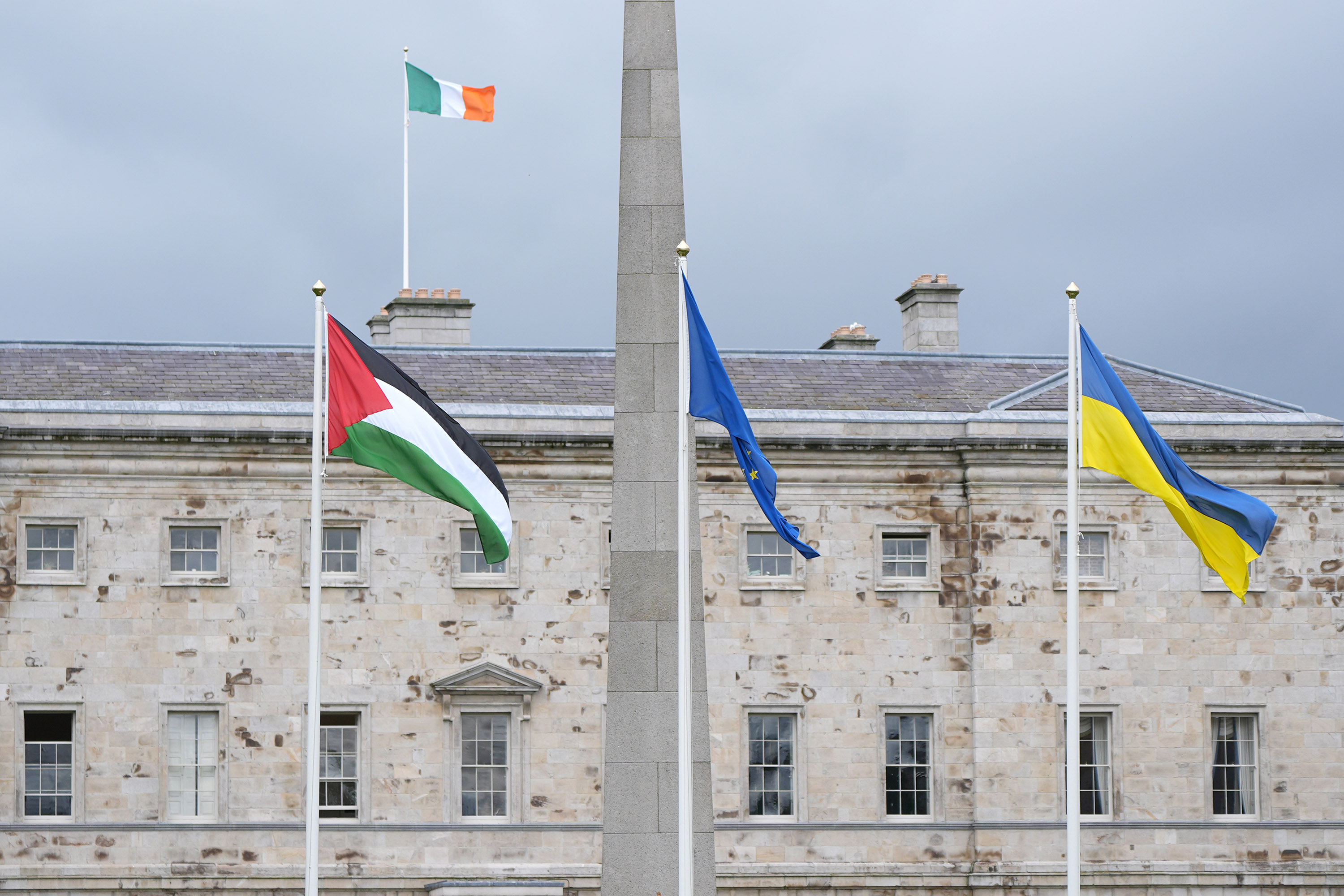
Ireland formally recognized the State of Palestine at a government meeting Tuesday.
“The Government recognises Palestine as a sovereign and independent state and agreed to establish full diplomatic relations between Dublin and Ramallah,” the Irish government said.
Ireland will appoint an ambassador to the State of Palestinian and a full Irish embassy, to be based in Ramallah.
“We had wanted to recognise Palestine at the end of a peace process. However we have made this move alongside Spain and Norway to keep the miracle of peace alive,” Prime Minister Simon Harris said.
Harris said that a two-state solution is "the only way for Israel and Palestine to live side by side in peace and security," and called on Israel Prime Minister Benjamin Netanyahu to "stop the humanitarian catastrophe" in Gaza.
Ireland, Norway and Spain each publicly announced plans on May 22 to recognize a Palestinian state on Tuesday, which are all now formally in effect.
Hundreds of aid trucks entered Gaza on Monday, but the actual distribution of that aid is a challenge
From CNN’s Ibrahim Dahman and Sarah El Sirgany
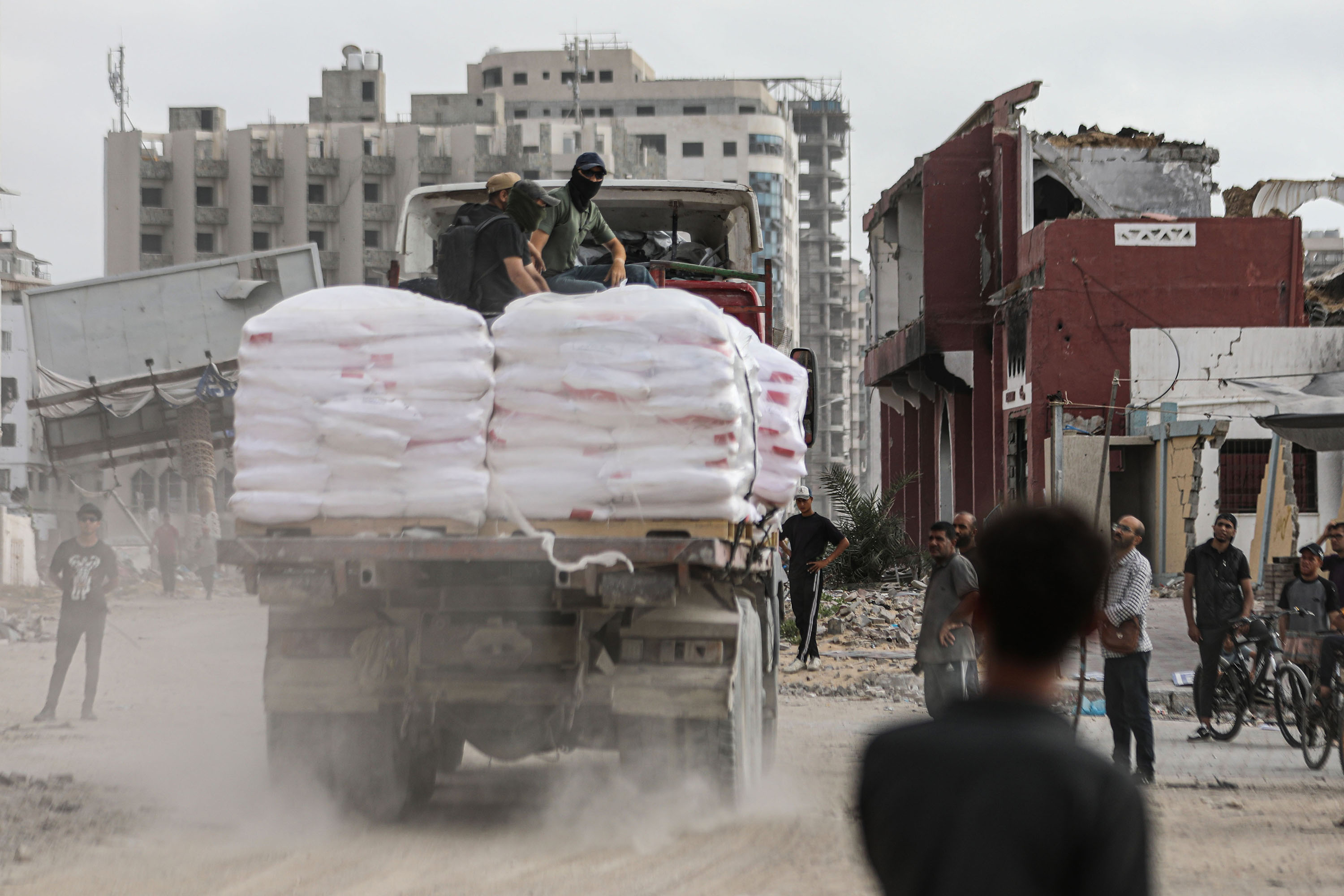
More than 370 trucks carrying humanitarian aid went into Gaza on Monday, including 154 trucks that had arrived at the Kerem Shalom crossing from Egypt, Israel's Coordinator of Government Activities in the Territories (COGAT) said.
Some 70 World Food Programme (WFP) trucks, that had arrived to Ashdod Port, entered Gaza carrying flour, COGAT said.
Hundreds of aid trucks have not yet been picked up by UN agencies for distribution inside the territory, COGAT said. The UN have said the retrieval and distribution of aid remains difficult due to the conditions on the ground.
UNRWA said on Monday that the aid agency picked up only 30 trucks for distribution on the Gaza side due to heavy movement restrictions, ongoing Israeli airstrikes, the launch of rockets by Hamas and limitations on the routes that can be used.
Norway declares "milestone" as it formally recognizes Palestinian state
From CNN’s Louis Mian and James Frater
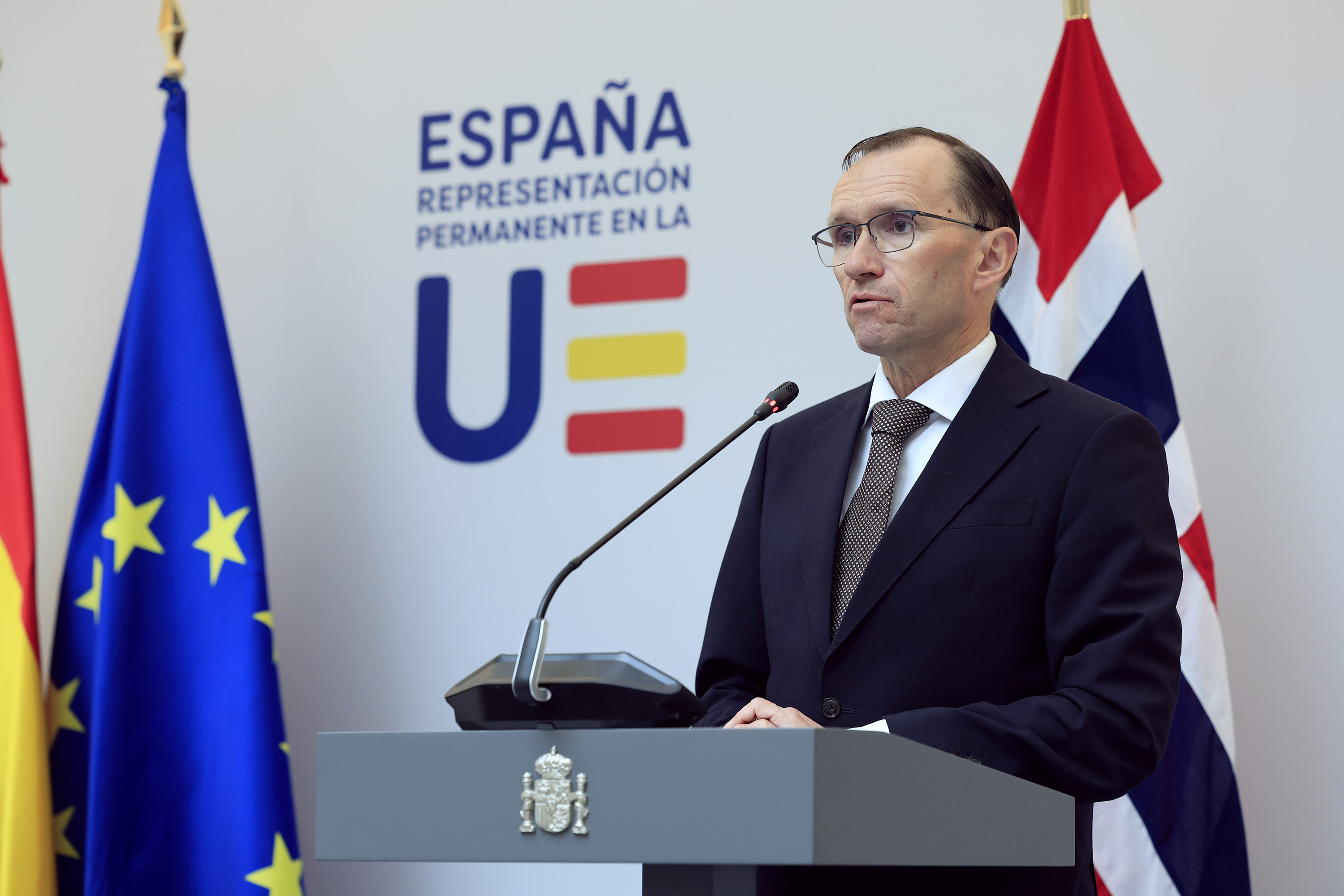
Norway's foreign minister said Tuesday marks “a milestone in the relationship between Norway and Palestine,” as the country officially recognizes a Palestinian state.
“For more than 30 years, Norway has been one of the strongest advocates for a Palestinian state,” Norwegian Foreign Minister Espen Barth Eide said in a statement Tuesday, as the country's formal recognition came into effect. “I have confidence that the Palestinian government will continue the difficult job of reform and lay the foundations for governing both the West Bank and Gaza after a ceasefire.”
“It is regrettable that the Israeli government shows no signs of engaging constructively," the Norwegian foreign minister said.
“The international community must increase its political and economic support for Palestine and continue the work for a two-state solution,” he added.
Eide handed the Prime Minister of the Palestinian Authority Mohammed Mustafa “a formal document of recognition” when they met in Brussels on Sunday.
Norway, Spain and Ireland each publicly announced plans on May 22 to formally recognize a Palestinian state on May 28. Earlier today, Spain announced it had done so.
Norwegian Prime Minister Jonas Gahr Støre said last week that “there will be no peace in the Middle East without a two-state solution.” Støre added that a Palestinian state was “a prerequisite for achieving peace in the Middle East.”
Spanish government officially recognizes Palestinian state
From CNN's Al Goodman in Madrid
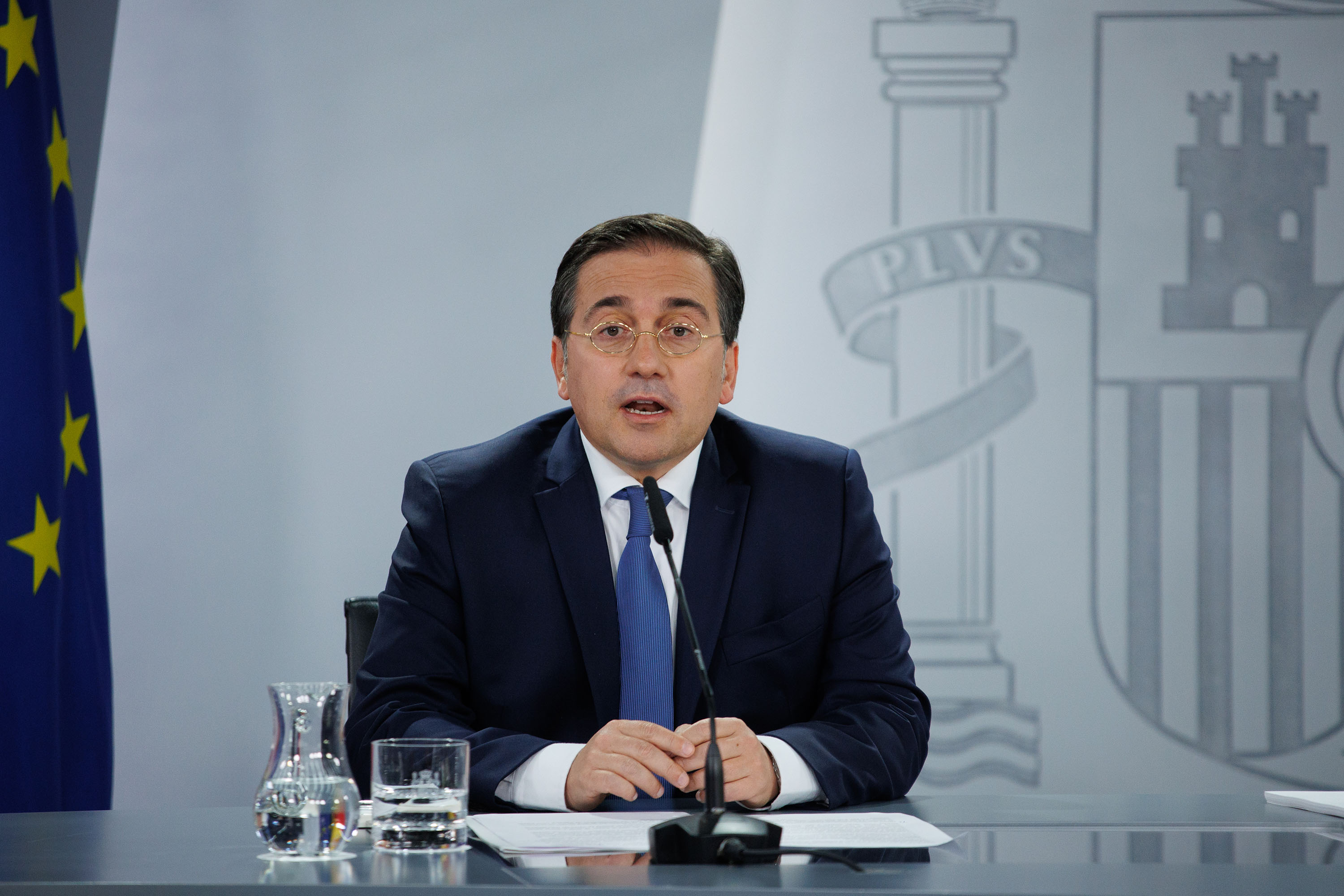
The Spanish government officially recognized a Palestinian state on Tuesday in a cabinet meeting, Foreign Minister José Manuel Albares told a news conference in Madrid.
Just before the cabinet meeting, Spanish Prime Minister Pedro Sánchez said in a nationally televised address that Spain would join “more than 140 countries that already recognize Palestine” and that it “is the only way to realize the solution that we all recognize as the only possible one to achieve a future of peace: that of a Palestinian State that coexists alongside the State of Israel in peace and security.”
Spain, Ireland and Norway each publicly announced plans on May 22 to formally recognize a Palestinian state on Tuesday.
Slovenian government will consider a proposal this week to recognize Palestinian state
From CNN’s Louis Mian in London
The Slovenian government will consider a proposal this week to recognize an independent Palestinian state, according to Prime Minister Robert Golob.
A government meeting on Thursday will consider forwarding “the recognition of Palestine” to the country’s legislature for approval, Golob in a statement.
“In the meantime, we will continue to coordinate with a group of like-minded countries in order to create maximum pressure for an immediate ceasefire and release of the hostages,” the prime minister said.
“As a responsible member of the [UN] Security Council, we have an obligation to do everything in our power to bring about lasting peace in the Middle East.”
Golob initiated the process “of recognizing Palestine as an independent and sovereign state” on May 9.
On Sunday, Slovenian Foreign Minister Tanja Fajon told Al Jazeera: “We’ve decided we have a moral duty, at least a symbolic duty, to give hope to Palestinians with this further step on recognition.” Fajon added there is a need to help “reform Palestinian authorities in Ramallah to be able, one day, also to control Gaza,” as she also expressed hope that “other countries will follow us.”
Last week, the governments of Ireland, Norway and Spain announced plans to formally recognize a Palestinian state.
British foreign secretary wants IDF investigation into Rafah airstrike to be "comprehensive and transparent"
From CNN’s Caitlin Danaher in London
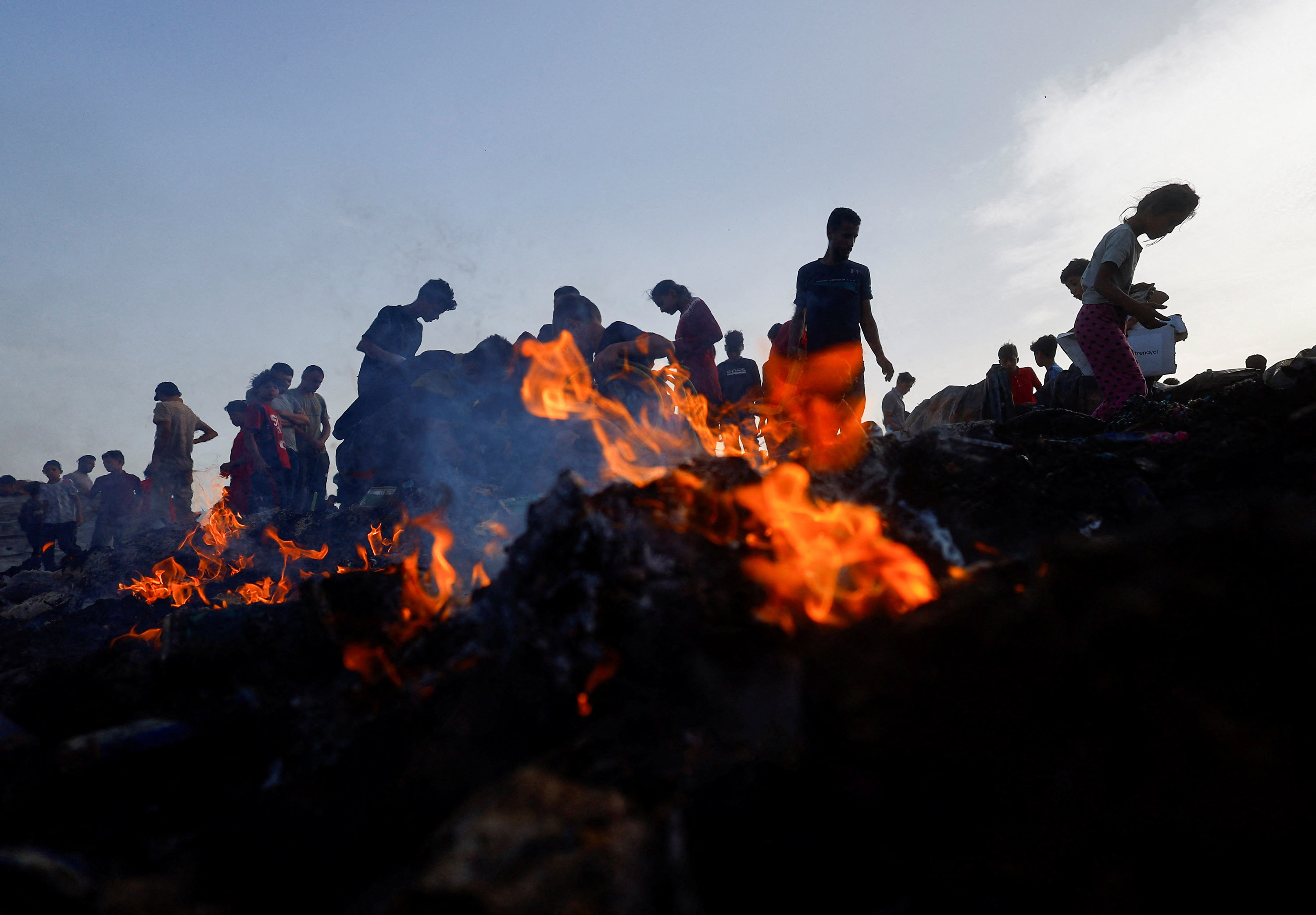
Britain's Foreign Secretary David Cameron has weighed in on the airstrike in Rafah that killed at least 45 people on Sunday — many of whom were women and children — calling for the investigation by the Israel Defense Forces (IDF) to be “swift, comprehensive & transparent.”
“Deeply distressing scenes following the airstrikes in Rafah this weekend. The IDF’s investigation must be swift, comprehensive & transparent,” Cameron said in a post on social media platform X on Tuesday.
The foreign secretary also called for an urgent deal “to get hostages out & aid in” and reiterated the need for a pause in fighting to enable work towards a long-term sustainable ceasefire.
The Israeli military General Staff's Fact-Finding and Assessment Mechanism is investigating the airstrike carried out in Rafah on Sunday, the Israel Defense Forces (IDF) said in a statement Monday. In addition to those killed, at least 200 were wounded in the strike on a camp for displaced people in Rafah, according to the government media office in Gaza.
Spain won’t recognize changes to Palestinian borders after 1967 unless agreed by all parties
From CNN’s Al Goodman in Madrid
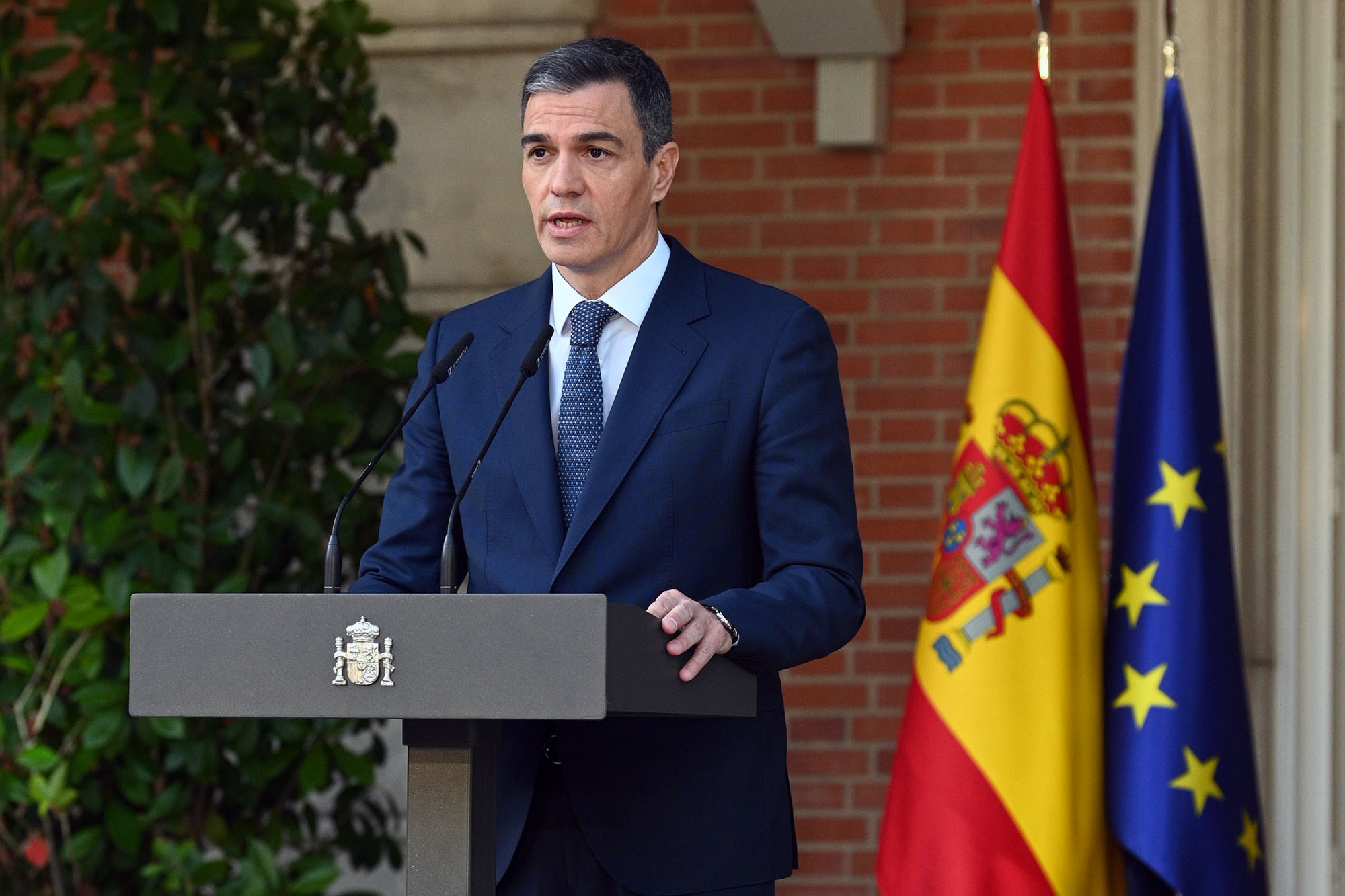
Spain will not recognize any changes to Palestinian borders after 1967 “other than those agreed to by the parties,” Spanish Prime Minister Pedro Sanchez said Tuesday.
“Although it is not up to Spain to define the borders of other countries, our position is aligned with the UN Security Council resolutions 242 and 338, and with the position of the European Union. Therefore, we won’t recognize changes in the 1967 lines other than those agreed to by the parties,” Sanchez said.
Spain will approve the official recognition of a Palestinian state today, Sanchez said, just before his cabinet was due to meet to take that step.
“The state of Palestine must be viable, with the West Bank and Gaza connected by a corridor and with East Jerusalem as its capital and must be unified under the legitimate government of the Palestine National Authority,” Sanchez said.
Norway and Ireland will also formally recognize a Palestinian state from today — a move that will bolster the global Palestinian cause but has further strained relations between Europe and Israel.
EU foreign ministers discuss sanctioning Israel, says Irish foreign minister
From CNN's James Frater in London
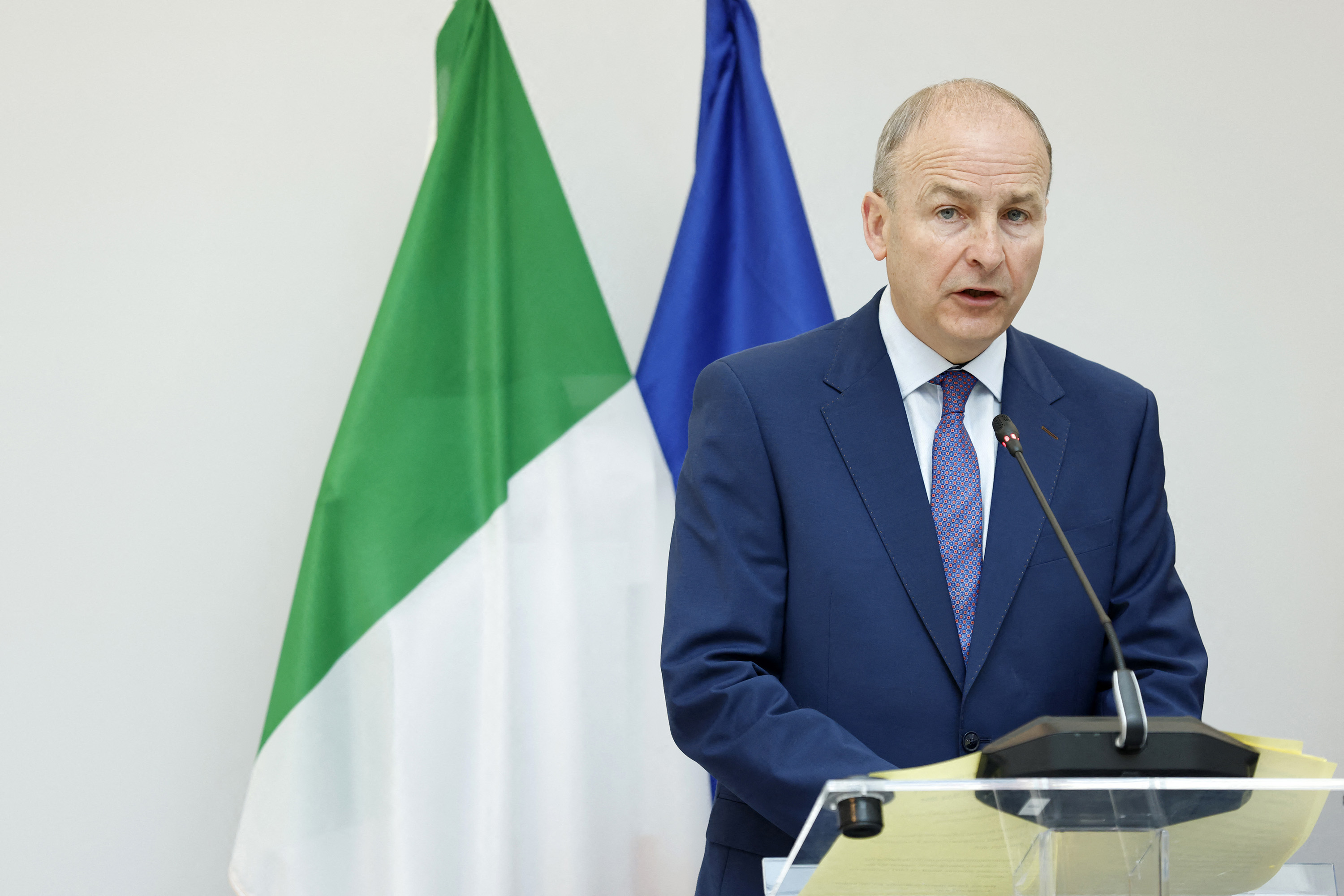
EU foreign ministers meeting in Brussels on Monday for the first time engaged in a “significant discussion” on sanctioning Israel if the country doesn’t comply with a ruling from the UN's top court, Irish Foreign Minister Micheál Martin said after the meeting.
Speaking to journalists, Martin said: “There was a very clear consensus about the need to uphold the international humanitarian and legal institutions such as the International Court of Justice, and indeed the ICC.”
On Friday, the UN’s top court, the International Court of Justice (ICJ), ordered Israel to immediately halt its controversial military operation in the southern Gaza city of Rafah, further increasing international pressure on Israel over its war against Hamas.
Martin said “Israel should adhere to those provisional orders to open the border crossing at Rafah and also to cease its military operation in Rafah.”
"One of the conclusions is to convene a meeting of the EU Israeli Association council to raise our grave concerns, and to put it to Israel, and to seek from Israel a response in terms of complying with the orders of the court."
The Irish foreign minister said that within the EU, “there's some distance between people articulating the need for a sanctions-based approach” if Israel does not comply with the International Court of Justice's rulings, versus “an agreement at an EU Council meeting, given all of the different perspectives there.”
“There is a lot of concern” in the EU institutions and European countries “in respect of what is a clear situation where the International Court of Justice have ruled, have made provisional orders," Martin said, adding that “the EU has always upheld the independence of that court and the need for nations to comply with it.”
1 million people have fled Rafah over three weeks, UNRWA says
From CNN’s Ibrahim Dahman
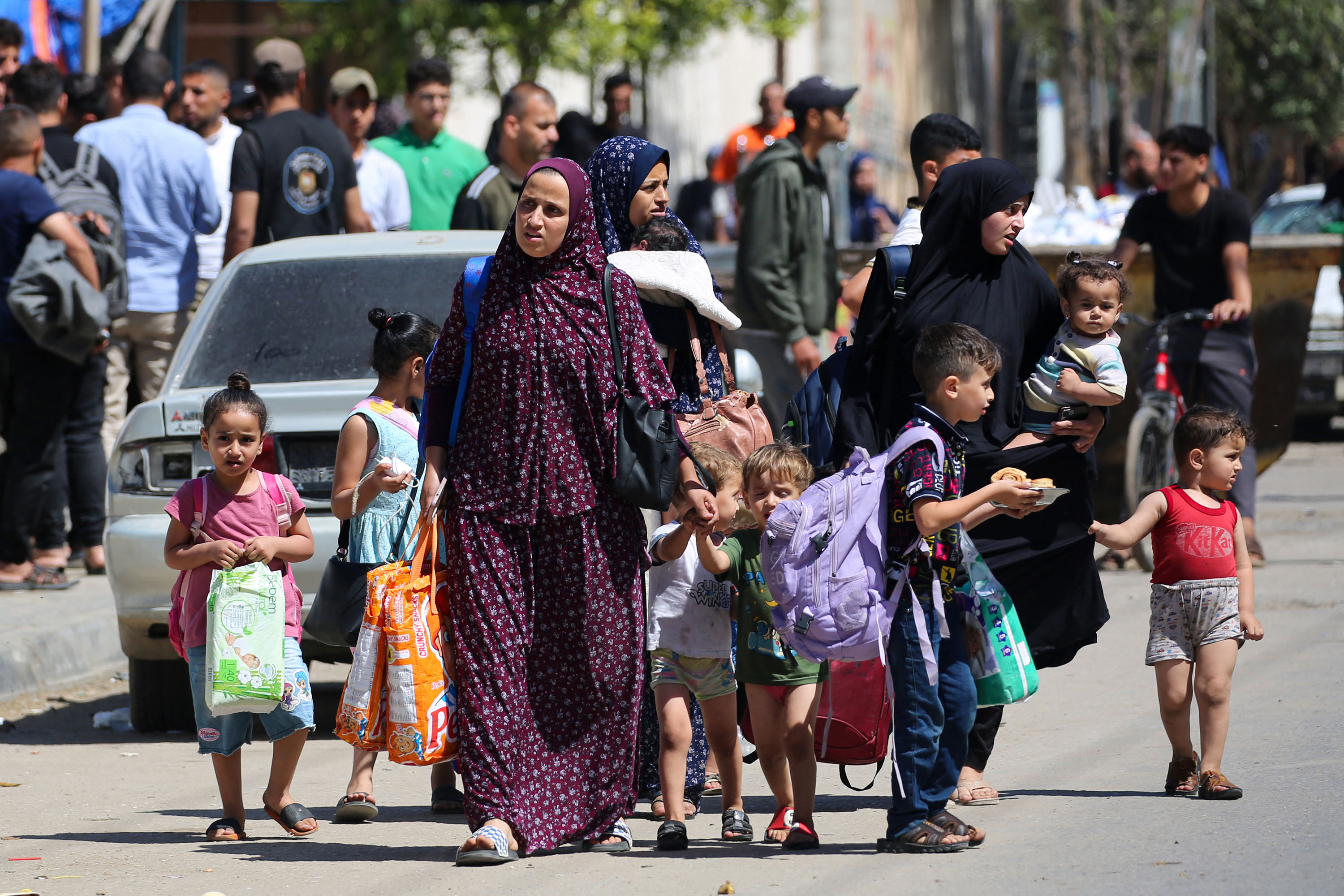
About one million people have fled Rafah over the past three weeks, according to the UN's main relief agency in Gaza (UNRWA).
“This happened with nowhere safe to go & amidst bombardments, lack of food & water, piles of waste & unsuitable living conditions,” UNRWA said in a post on X.
“Day after day, providing assistance & protection becomes nearly impossible,” the agency said.
Over a million Palestinians had been sheltering in Rafah before Israel ramped up airstrikes and ground operations there, many having fled to the city from other areas of Gaza after Israel launched its war on Hamas.
Israel had ordered thousands of civilians to leave some areas of Rafah as it intensified its military operations in the city.
Remember: Israel has vowed to press on with its Rafah offensive despite international outrage and a US warning not to proceed. The International Court of Justice has ordered Israel to halt its offensive in the city, adding to the unprecedented level of diplomatic pressure that Netanyahu is facing over the war in Gaza.
Days after the ICJ ruling, an Israeli airstrike on a displacement camp in Rafah killed at least 45 people, drawing global condemnation.
"State of Palestine must be viable," Spanish prime minister says ahead of formal recognition
From CNN’s Al Goodman in Madrid
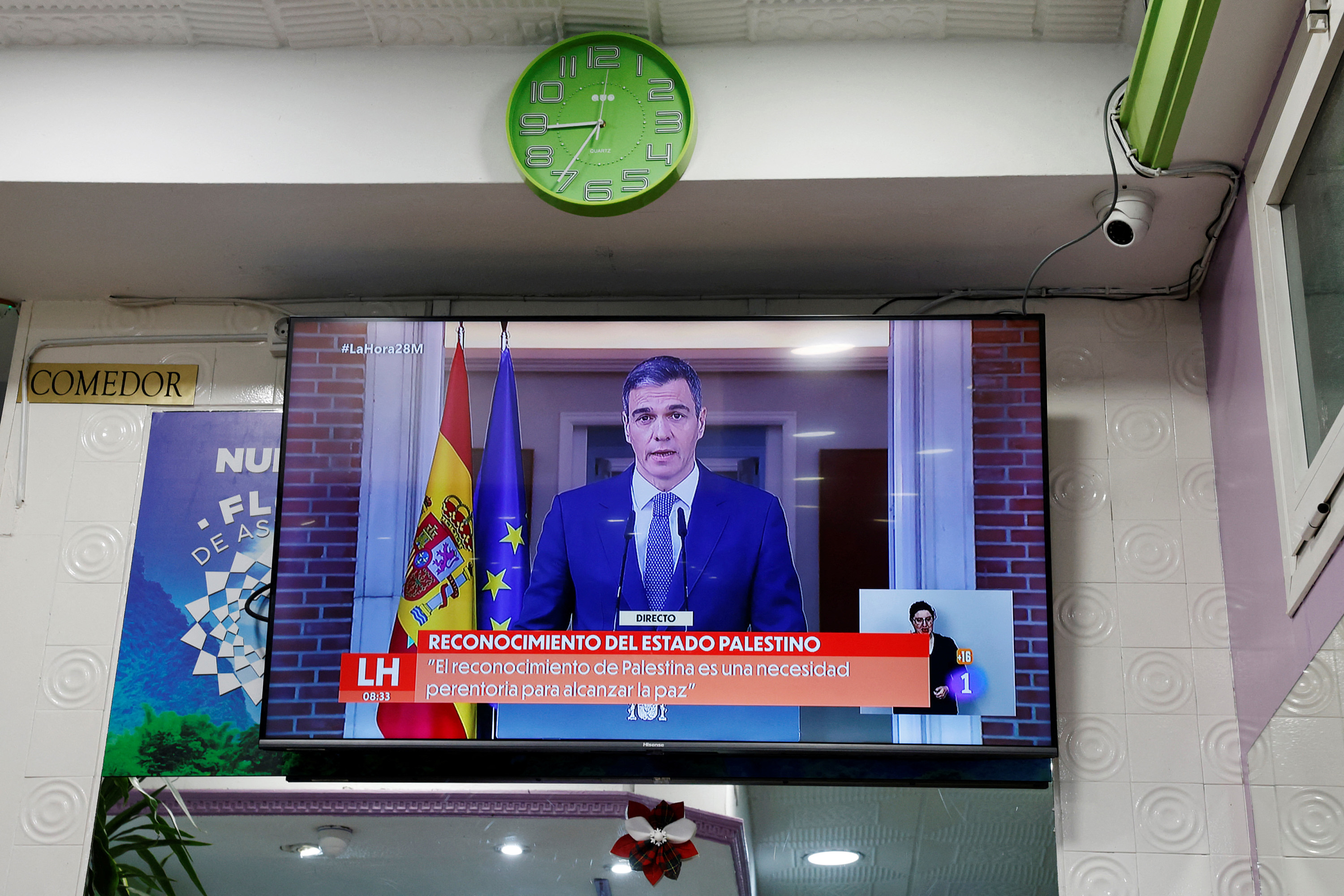
The Spanish government will approve the official recognition of a Palestinian state today, Prime Minister Pedro Sanchez said, just before his cabinet was due to meet to take that step.
“The state of Palestine must be viable, with the West Bank and Gaza connected by a corridor and with East Jerusalem as its capital and must be unified under the legitimate government of the Palestine National Authority,” Sanchez said.
He called the recognition "a historic decision — to contribute to Israelis and Palestinians living in peace."
Norway, Spain and Ireland will formally recognize a Palestinian state from today — a move that will bolster the global Palestinian cause but has further strained relations between Europe and Israel.
"We don’t adopt this against anyone, certainly not against Israel, a friend whom we respect. This is a full-fledged rejection of Hamas, which rejects two states,” Sanchez said Tuesday.
Israelis and Palestinians must make key decisions on core issues to end conflict, former peace negotiator says
From CNN staff
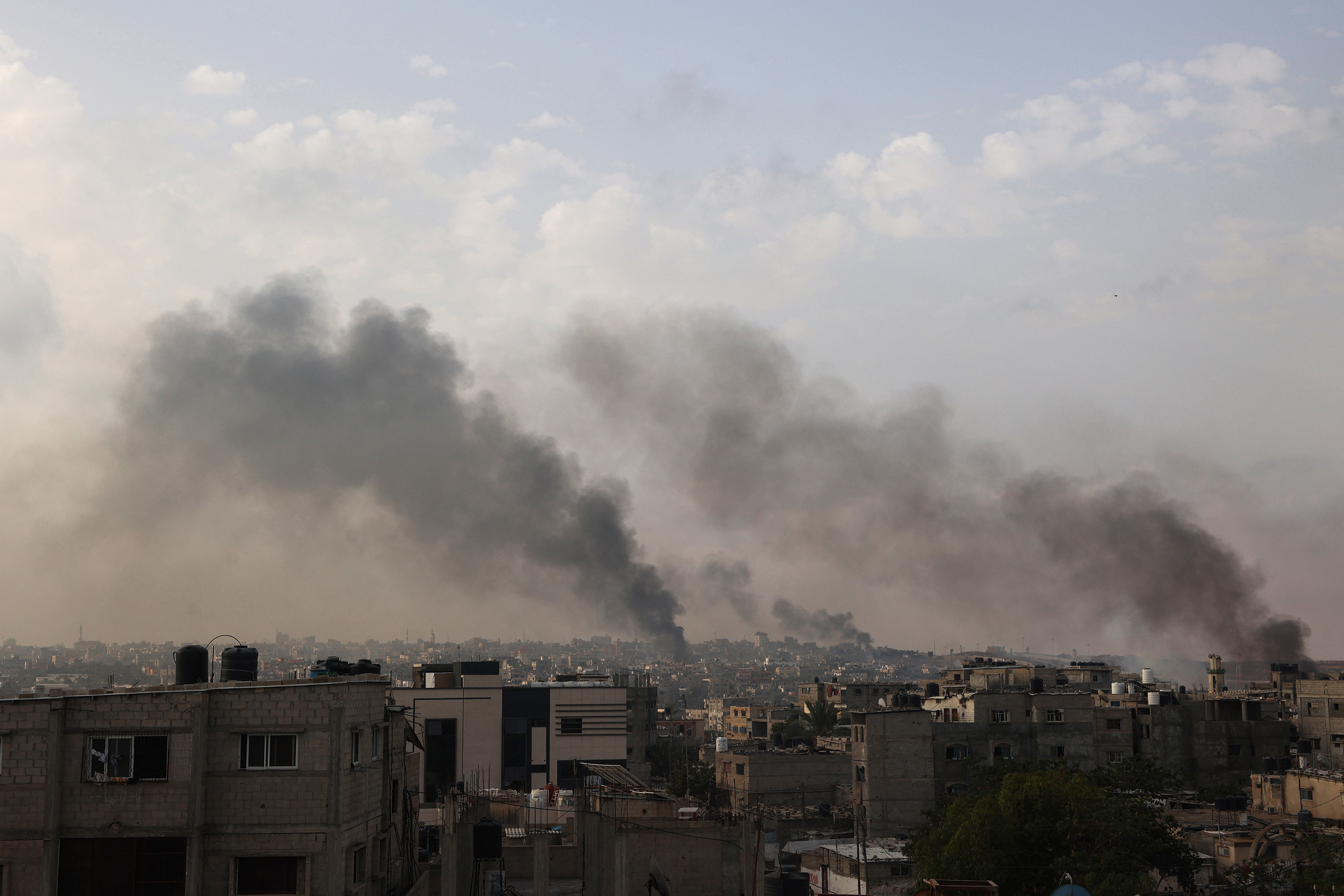
Formally recognizing a Palestinian state "will not bring Israelis and Palestinians any closer to a comprehensive conflict-ending solution," a former peace negotiator for the US State Department said Tuesday.
Norway, Spain and Ireland will formally recognize a Palestinian state from today — a move that will bolster the global Palestinian cause but has further strained relations between Europe and Israel.
"The reality is that no matter how many countries sign up for this, endorsing a virtual state is not going to bring Israelis and Palestinians any closer to a comprehensive conflict-ending solution," Aaron David Miller, also a senior fellow at the Carnegie Endowment for International Peace, told CNN's Rosemary Church.
"That is going to come only when Israelis and Palestinians believe that they are prepared to make key decisions on core issues like border security, refugees and Jerusalem."
"Right now in the wake of the October 7 attack, we are still a very long way away from any sort of negotiation that could create a better pathway to states living alongside in peace and security," he said.
Has Biden's red line on Rafah been crossed?
From CNN staff
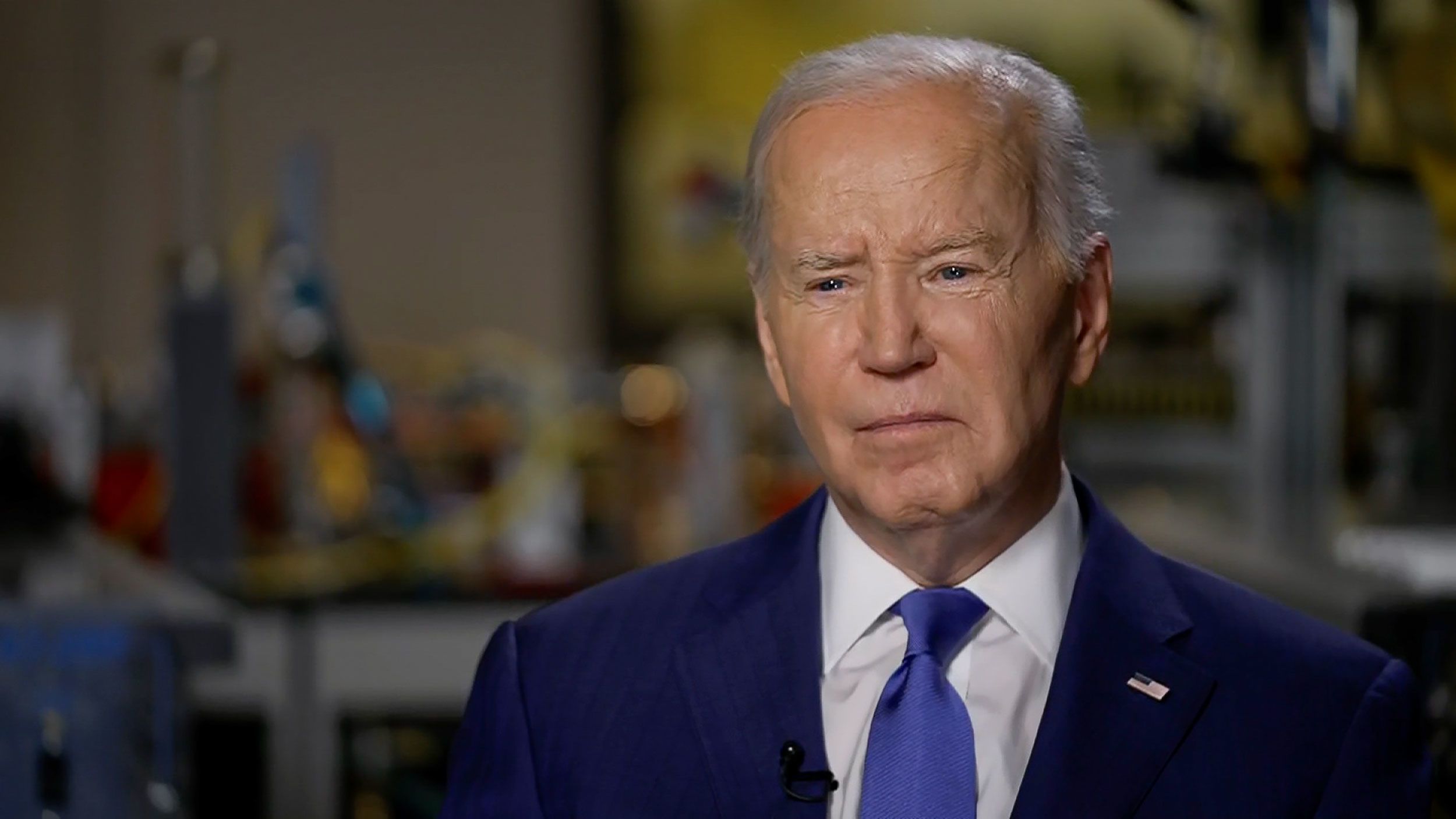
US President Joe Biden told CNN earlier this month that he’d halt some shipments of American weapons to Israel – which he acknowledged have been used to kill civilians in Gaza – if it invades Rafah.
“I made it clear that... if they go into Rafah, I’m not supplying the weapons that have been used historically to deal with Rafah, to deal with the cities – that deal with that problem,” Biden said.
“I’ve made it clear to Bibi and the war cabinet: They’re not going to get our support, if in fact they go on these population centers,” Biden added, referring to Israeli Prime Minister Benjamin Netanyahu.
In giving Netanyahu this ultimatum in May, Biden set a red line on Israel's actions in Gaza.
Deadly strike: Israel's strike on a displacement camp in Rafah on Sunday killed at least 45 people and wounded 200 others. It is among the deadliest strikes by the Israeli military on Gaza’s southernmost city since Israel began its operation there on May 7.
What the US is saying: Biden is yet to comment publicly on Sunday's strike. A US National Security Council spokesperson said the strike was “heartbreaking," and that the US was “actively engaging” with Israel to determine what happened. But the spokesperson also said that "Israel has a right to go after Hamas."
The US has supported Israel’s efforts to go after Hamas while warning against an invasion of Rafah, which would lead to widespread civilian casualties. In recent weeks, Biden's top national security aide Jake Sullivan engaged Israeli officials, including Netanyahu, emphasizing the US position. Sullivan said he had detected “refinements” to Israel’s Rafah plan, which he said was now more “targeted and limited” in scale.
Israel digs in: Last week, Israeli Defense Minister Yoav Gallant said Israel would expand its ground operation in Rafah. After meeting Sullivan, he said: “I emphasized to him Israel's duty to expand the ground operation in Rafah, to dismantle Hamas and return the abductees."
Global outcry: The strike on the Rafah camp, which killed and wounded many women and children, has sparked a mounting global outcry. The UN is holding an emergency session on the strike on Tuesday — adding to the unprecedented pressure on Israel over its Gaza offensive, and on its staunch ally the United States.
Mounting pressure: It also came just days after the International Court of Justice ordered Israel to “immediately halt” its military operation in Rafah, and any action in the city “which may inflict on the Palestinian group in Gaza conditions of life that could bring about its physical destruction in whole or in part.”
3 European nations will formally recognize a Palestinian state today
From CNN staff

Spain, Ireland and Norway are set to formally recognize a Palestinian state today — a move that will bolster the global Palestinian cause but has further strained relations between Europe and Israel.
The three European nations say their landmark decision is the best way to achieve lasting peace in the Middle East, but it sparked swift condemnation from Israel, as its foreign minister ordered the immediate recall of its ambassadors from those countries.
Most of the world already recognizes Palestinian statehood: More than 140 out of 193 member states of the United Nations have made their recognition official. But only some nations in the 27-member European Union are among them. Nations that don't include staunch allies of Israel such as the United States and Germany.
On May 10, a non-binding vote at the UN General Assembly showed overwhelming international support for an independent Palestinian state, leaving the US and a few of Israel’s allies isolated. Israel and the US maintain that a Palestinian state should only be established through a negotiated settlement.
Pressure on Israel: The planned recognition symbolizes the huge amounts of pressure Israel is under after seven months of war that has devastated Gaza, caused a humanitarian crisis and killed more than 36,000 people in Gaza since October 7.
It comes after the International Court of Justice ordered Israel to immediately halt its military operation in Rafah. And Israel is facing unprecedented levels of diplomatic pressure to rein in its military offensive in Gaza.
Overnight Israeli bombings in Gaza kill six people, says Palestinian news agency
From CNN's Mohammed Tawfeeq
Israeli bombings in various areas of Gaza killed at least six people and wounded several others, the Palestinian news agency Wafa said early Tuesday morning, citing medical sources in Gaza.
An Israeli strike on a house in the Daraj neighborhood of Gaza City killed at least two people and wounded others, Wafa said.
Israeli artillery shelling targeting a tent of displaced people in Tal al-Sultan, northwest of Rafah, killed three people and wounded several others, Wafa reported.
Israeli artillery shelling in the city of Rafah killed a young man, according to Wafa.
CNN has reached out to the Israel Defense Forces for comment.
Global outrage mounts after "horror" of Israeli strike on Rafah camp comes to light. Here's the latest
From CNN staff
International outcry is mounting over Israel's airstrike on a camp for displaced Palestinians in Rafah that killed at least 45 people and wounded 200 others, many of whom were women and children.
In response, Prime Minister Benjamin Netanyahu called the strike a "tragic error" and said that Israel was investigating the incident.
Footage obtained by CNN showed the camp in flames, with scores of men, women and children frantically trying to find cover from the nighttime assault. Burned bodies, including those of children, could be seen being pulled by rescuers from the wreckage.
Graphic video shows scale of devastation in Rafah:
The strike came days after the International Court of Justice ordered Israel to halt its offensive in the city, and several humanitarian organizations have called on the UN Security Council to enforce the court's orders, saying "immediate action is required."
A growing list of countries, world leaders and aid agencies have now condemned the strike, saying "there is no safe space in Gaza."
Here are some of the international reactions:
- "Horror must stop": UN chief Antònio Guterres issued a blistering condemnation. "There is no safe place in Gaza. This horror must stop," he said. The UN Security Council will hold an emergency meeting to discuss the strike on Tuesday, according to a UN diplomat.
- "Abomination": UN relief chief Martin Griffiths criticized Netanyahu's response to the attack. "Whether the attack was a war crime or a 'tragic error' for the people of Gaza, there is no debate. What happened last night was the latest – and possibly most cruel – abomination," Griffiths said.
- "Unbearable": French President Emmanuel Macron said he was "outraged" by the strikes and called for a ceasefire. Germany described the "images of charred bodies, including children, from the airstrike" as "unbearable." The European Union’s foreign policy chief, Josep Borrell, said Israel must implement the ICJ ruling. Turkey’s President Recep Tayyip Erdoğan called the strike a "massacre" and said his country “will do everything” in its power to hold Israeli officials accountable.
- "Heartbreaking": A US National Security Council spokesperson said the strike was “heartbreaking," adding that the United States was “actively engaging” with officials in Israel to determine what happened. The spokesperson also said "Israel has a right to go after Hamas, and we understand this strike killed two senior Hamas terrorists who are responsible for attacks against Israeli civilians."
- "Complete disregard for the lives of civilians": Doctors Without Borders (Médecins Sans Frontières) strongly denounced the strike and called for an "immediate and sustained ceasefire" in Gaza. MSF said the airstrike on the camp "shows the complete disregard for the lives of civilians." MSF nurse activity manager Gaia Giletta said from Gaza that "we are shocked by the continuous attacks on civilians, and we have no words to describe the horror of what we've seen here."
- "Hell on earth": “The images from last night are a testament to how Rafah has turned into hell on earth," said Philippe Lazzarini, the Commissioner-General of the UN Relief and Works Agency for Palestine Refugees (UNRWA). The scenes from Rafah last night are harrowing, Lazzarini said, and some victims “were reportedly burnt to death."
- Strike could hinder hostage talks: Qatar said Israel’s strike on the Rafah camp could “hinder” negotiations aiming for the release of hostages and reaching a ceasefire in Gaza. The Qatari foreign ministry said the strike is a “serious violation of international laws” and expressed concern that it “would complicate the ongoing mediation efforts.”
This post has been updated after additional review of the translation from Hebrew to English, to clarify the wording used by Israeli Prime Minister Benjamin Netanyahu when he referred to a deadly Israeli strike on Rafah, Gaza. The word "error" was originally translated as "mistake".
UN Security Council will hold emergency meeting today after Israeli strike in Rafah
From CNN's Richard Roth in New York
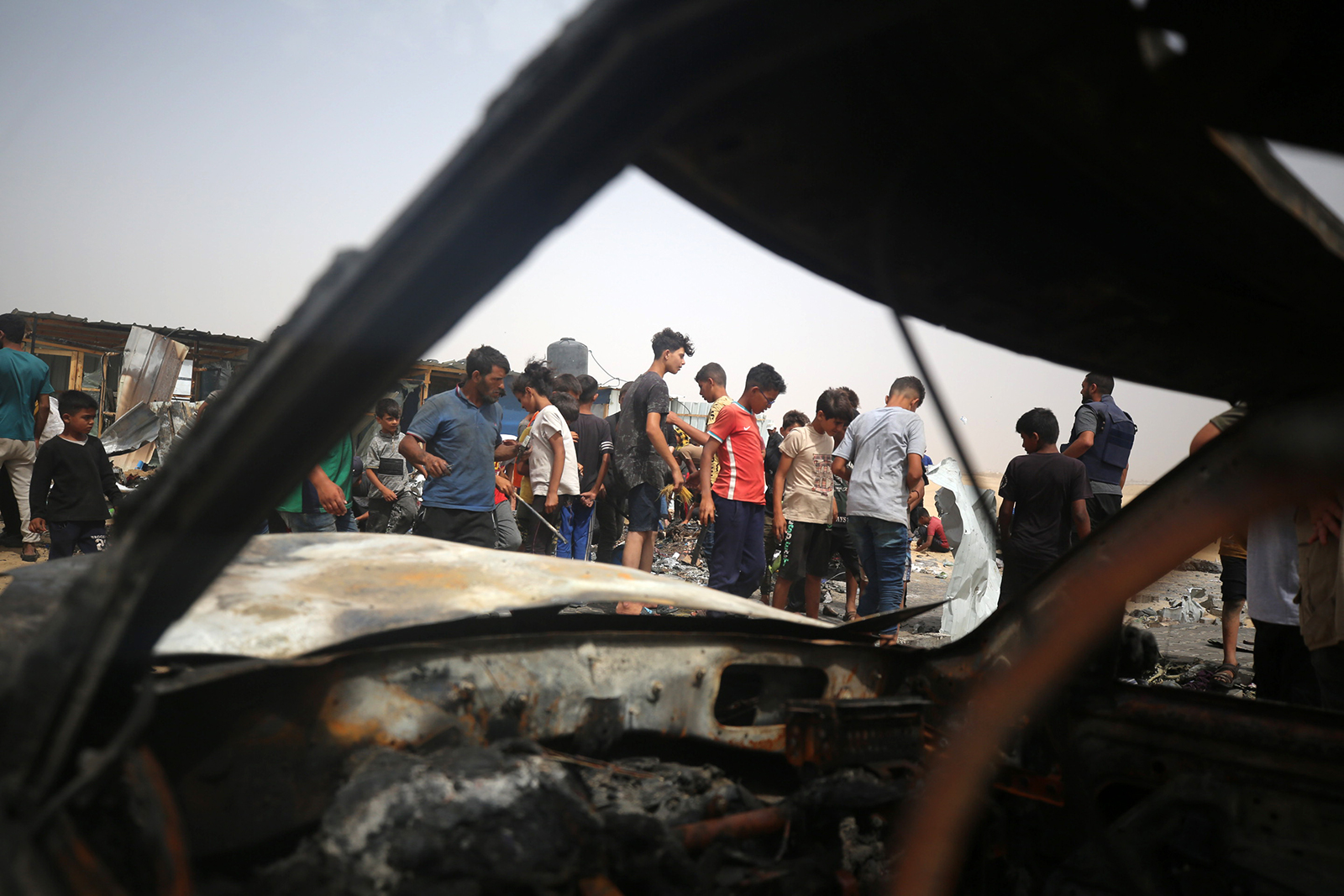
The UN Security Council will hold an emergency meeting today to discuss a deadly Israeli airstrikeon a displaced person tent camp in the southern Gaza city of Rafah on Sunday, according to a UN diplomat.
The meeting was requested by Algeria, the diplomat said.
The Security Council will hold private discussions on Tuesday afternoon at 3.30 p.m., the diplomat said.
UN Secretary-General Antònio Guterres issued a blistering condemnation on Monday.
"I condemn Israel’s actions which killed scores of innocent civilians who were only seeking shelter from this deadly conflict," Guterres said on X.
"There is no safe place in Gaza. This horror must stop," he added.
Palestinians with disabilities fear being killed first, UN committee says
From CNN's Jennifer Deaton in Atlanta
Palestinians with disabilities in Gaza fear they will be killed first because of limited opportunities to flee due to their impairment, the UN Committee on the Rights of Persons and Disabilities (CRPD) said in a release on Monday.
“The vast destruction of housing and civil infrastructure and the resultant rubble has curtailed any possibility of movement that is essential to escape, evacuate and seek protection,” the committee said.
Among the examples cited was that of a 14-year-old girl with cerebral palsy who had lost her assistive devices, including a wheelchair, and had to be carried by her parents while fleeing from the north of Gaza to the south amid Israel's offensive.
At one point, the girl told her family: "Leave me here, and you run away," the committee said. The girl survived but is at risk of being displaced again, it added.
The CPRD called for an immediate ceasefire and underscored the obligation to the Convention on the Rights of Persons and Disabilities, which calls for all necessary measures to ensure the protection and safety of people with disabilities in situations of risk, including in armed conflict.
CNN has previously reported on the struggles of disabled Palestinians in Gaza.
Fear of escalation after deadly shooting on Egypt-Gaza border
From CNN's Mostafa Salem and Sarah El Sirgany
The Israeli attack on the Philadelphi corridor creates an "uncontrollable situation, in the field and psychologically, that can lead to an escalation," Egyptian state-affiliated Al-Qahera News reported on Monday, citing an Egyptian security source.
"We warn against compromising the security and safety of Egyptian security personnel deployed on the border," the source said, as cited by Al-Qahera News.
What's happening: The relationship between Egypt and Israel became tense after Israeli troops moved into an area known as the Philadelphi Corridor and took control of the Rafah crossing earlier this month. The corridor is a 14-kilometer (8.7-mile) long and 100-meter-wide strip along the border between Gaza and Egypt.
Egypt’s military spokesperson said a person was killed during a shooting Monday on the border. Israel’s military also acknowledged that a “shooting incident” had occurred. Investigations are underway.
There was a shootout "between Israeli Occupation forces and Palestinian resistance, according to the initial investigation of the shooting. There was gunfire in multiple directions, and Egyptian security personnel took protective measures and dealt with the source of fire," the security source added according to Al-Qahera News.
Deadly Israeli strike on Rafah was a "tragic error," Netanyahu says
From CNN's Jonny Hallam
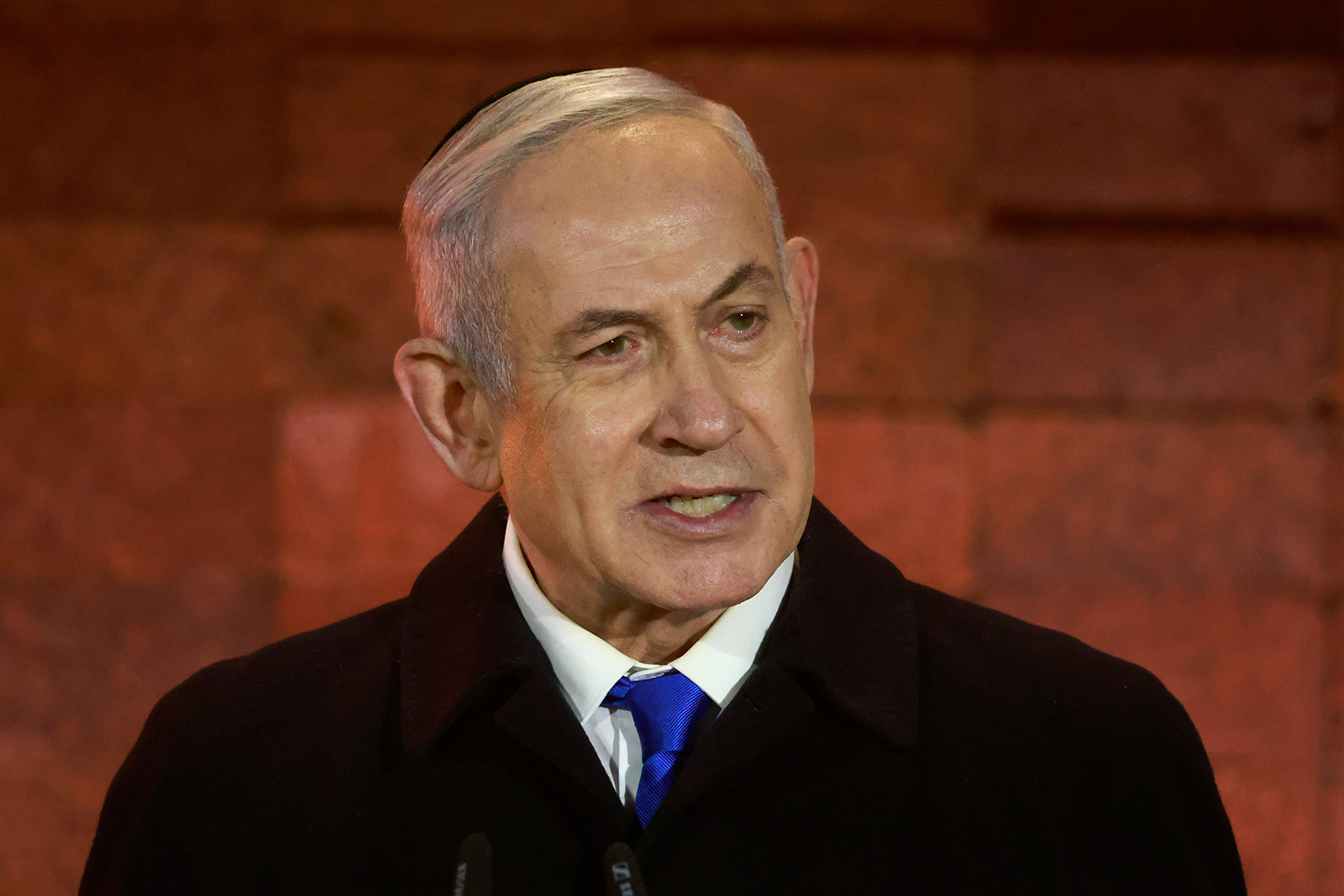
Israel's Prime Minister Benjamin Netanyahu has said Sunday's deadly Israeli airstrike on a Rafah camp had gone tragically wrong, but that he would not end the war in Gaza until the military's goals were completed.
"Despite our best effort, not to harm those not involved, unfortunately a tragic error happened last night. We are investigating the case," Netanyahu said about the strike in a speech at the Israeli Knesset on Monday.
At least 45 people were killed and 200 wounded after the Israeli strike hit a camp for displaced people, according to the government media office in Gaza.
The Israeli military’s General Staff's Fact-Finding and Assessment Mechanism is investigating an airstrike carried out in Rafah on Sunday, the Israel Defense Forces (IDF) said in a statement on Monday.
Speaking in Hebrew to the Knesset, Netanyahu said he would not “surrender” or “end the war before all its objectives are completed.”
“The pressure directed at home and abroad towards the Israeli government, which is fighting with all its might to return the hostages, only hardens the positions of (Hamas leader Yahya) Sinwar, who demands from Israel surrender conditions that endanger its existence, and therefore we cannot agree to them,” Netanyahu said.
“I would like to make it clear: I am not ready to surrender and retreat. I am not ready to end the war before all its objectives are completed.”
This post has been updated after additional review of the translation from Hebrew to English, to clarify the wording used by Israeli Prime Minister Benjamin Netanyahu when he referred to a deadly Israeli strike on Rafah, Gaza. The word "error" was originally translated as "mistake".
Spain to ask EU allies to back ICJ order for Israel to halt Rafah operation
From CNN's Duarte Mendonca in London
Spanish Foreign Minister José Manuel Albares said he will ask European Union member states to officially back the International Court of Justice (ICJ) order for Israel to halt its military operation in Rafah.
Speaking Monday alongside the Irish and Norwegian foreign ministers at a news conference in Brussels, Albares said he would ask the other 26 EU members to declare their backing of the ICJ's decision and that, if Israel opposes the court's decision, "to take the right measures to enforce that decision and to back one of the most important bodies of the UN charter."
Last week, Spain, Ireland and Norway announced they will formally recognize a Palestinian state.
Some background: On Friday, the ICJ ordered Israel to immediately halt its military operation in the southern Gaza city of Rafah, further increasing international pressure on Israel as it wages its war against Hamas.
Qatar says Israel's strike on Rafah could "hinder" ceasefire-for-hostage negotiations
From CNN’s Mostafa Salem in Abu Dhabi
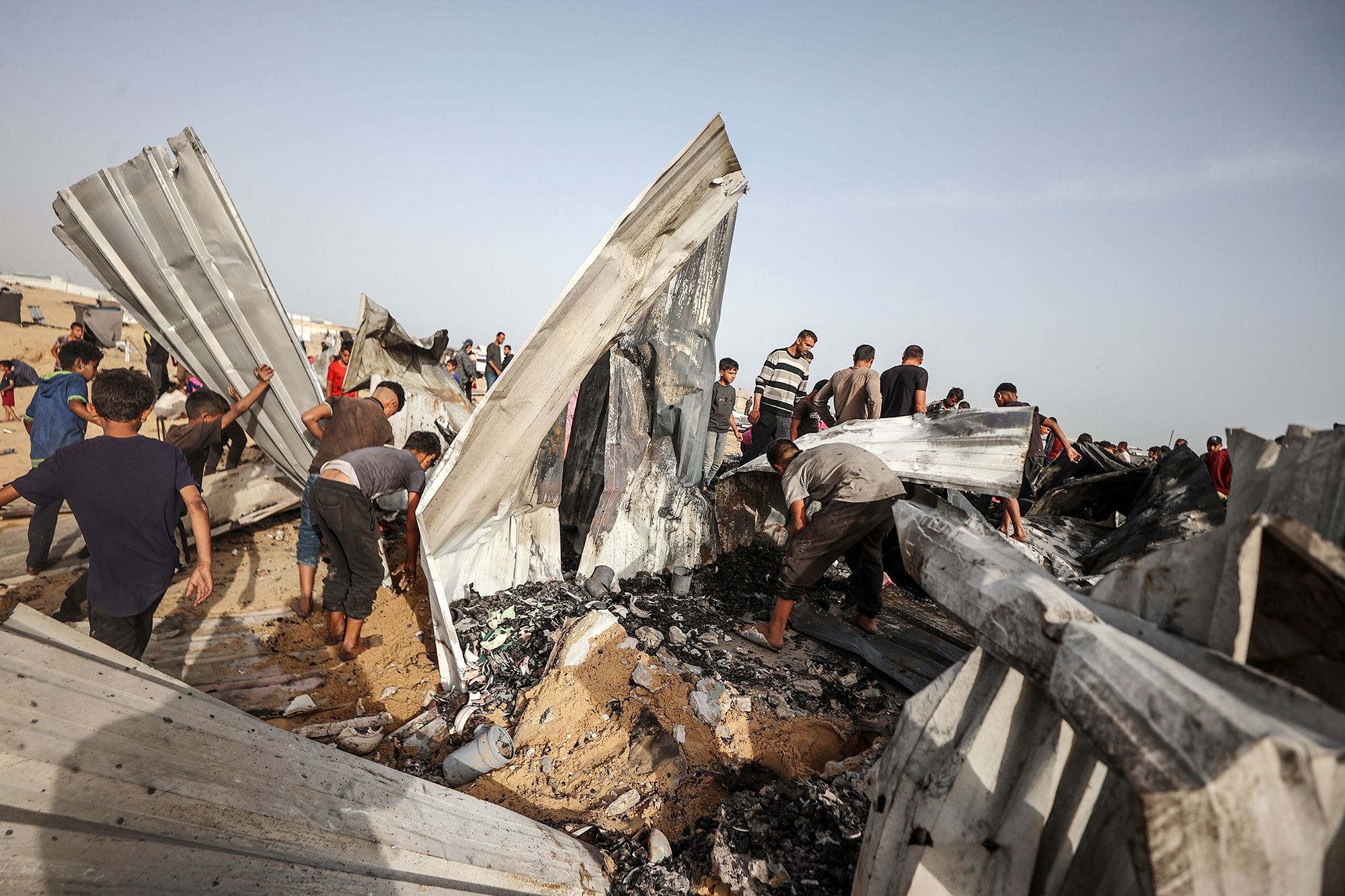
Qatar said Israel’s strike on a Rafah displacement camp could “hinder” ongoing negotiations aiming for the release of hostages and reaching a ceasefire in Gaza.
The Qatari foreign ministry said Monday that the strike is a “serious violation of international laws” and expressed concern that it “would complicate the ongoing mediation efforts.”
Israel said it killed two Hamas commanders using “precise munitions” in the strike. Gaza health authorities said 35 people were killed, mostly women and children. Video obtained by CNN shows tent-like structures on fire and charred bodies being pulled from rubble.
Talks to resume: Negotiations between Israel and Hamas for a ceasefire-and-hostage-swap deal are set to resume in Cairo on Tuesday, according to an Egyptian official. Talks between Israel and Hamas have stalled for months, with both parties failing to reach an agreement over differences on key demands. Israeli Prime Minister Benjamin Netanyahu has expressed strong opposition to the demands made by Hamas.
Rafah's Kuwaiti hospital forced to close after Israeli attack killed 2 staffers
From CNN's Abeer Salman and Kareem Khadder
The Kuwaiti Hospital in central Rafah was forced to close on Monday after the Israeli military attacks increased around the hospital.
Recent, "repeated and deliberate" attacks by Israeli forces had led to the death of two staff working in the hospital, as well as the injury of five medical staff, according to Dr. Suhaib Al-Hims, director of the Kuwaiti hospital.
The remaining medical teams were being transferred to a field hospital that is being prepared in the Al-Mawasi area of Gaza, Al-Hims said.
Earlier on Monday, the Ministry of Health in Gaza reported that an Israeli drone strike killed two staff members while they were on duty in front of the gate. They were identified as Rashid Mohammed Saeed Barhoum, 23, and Musab Sami Dakhlallah Al-Araj, 22.
Aid agencies call on UN Security Council to enforce ICJ orders on Israel’s actions in Rafah
From CNN’s Sarah El Sirgany and Zeena Saifi
Several global aid organizations penned a joint letter on Monday calling on the UN Security Council to enforce the International Court of Justice’s (ICJ) orders that Israel “immediately halt” its military offensive in Rafah.
“Immediate action is required to uphold international law and ensure the government of Israel meets its obligations as mandated by the ICJ,” the letter read.
Despite the order, "bloodshed has continued," the letter read.
“We call on the UN Security Council to take decisive action to ensure the ICJ's orders are implemented, allowing humanitarian aid to reach those in need and enabling thorough investigations into violations of international law.
"The Security Council must act now to uphold justice, protect human rights, and maintain international peace and security. Failure to do so would further compromise the conditions to sustain human life in Gaza and would undermine global trust in the primacy of international law.”





Geen opmerkingen:
Een reactie posten